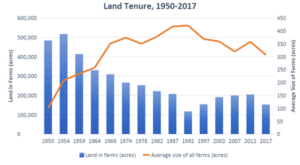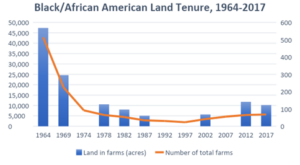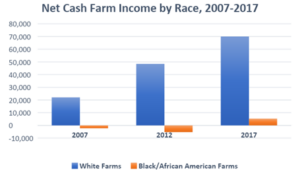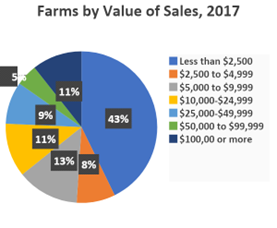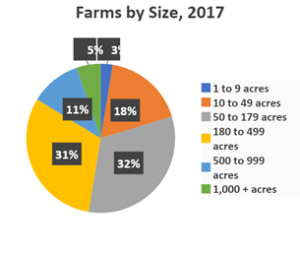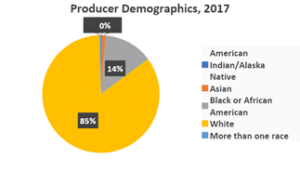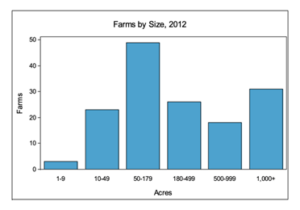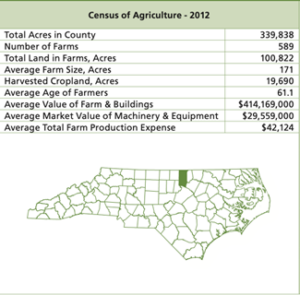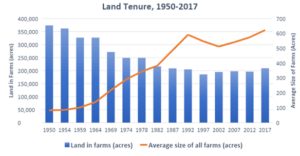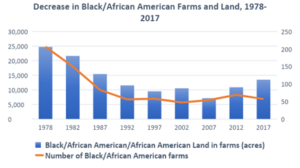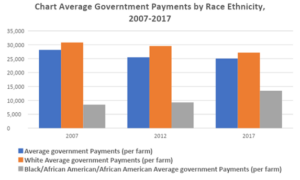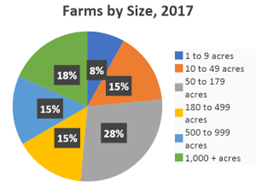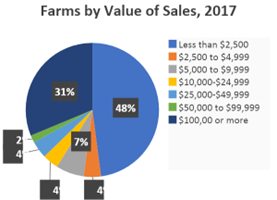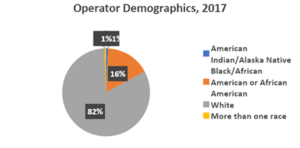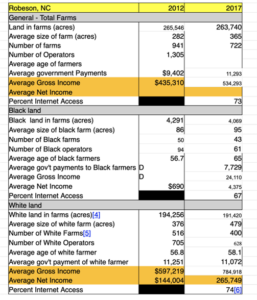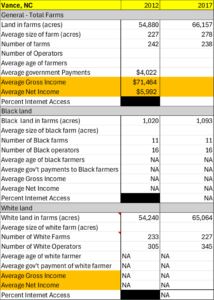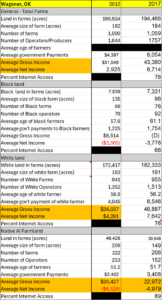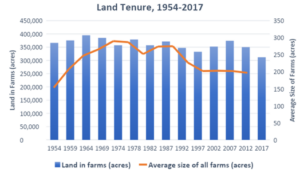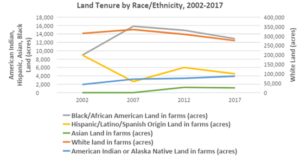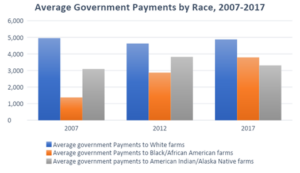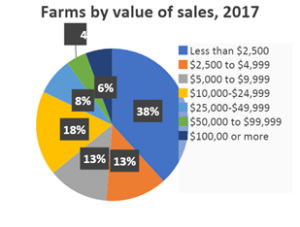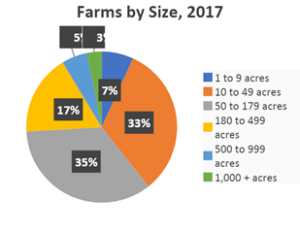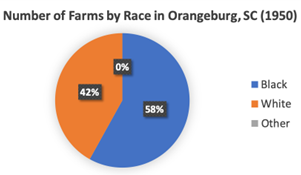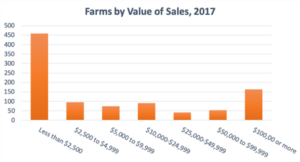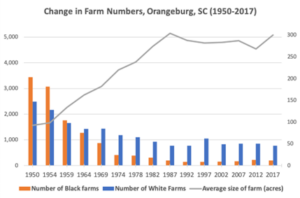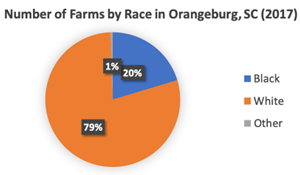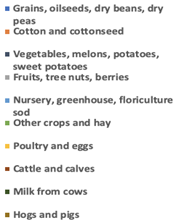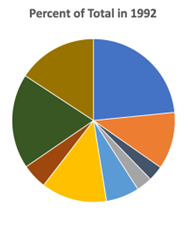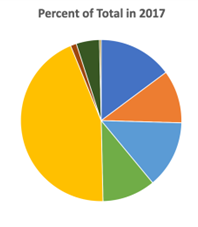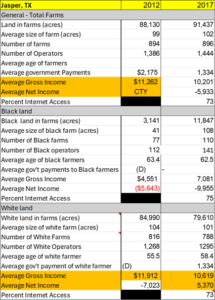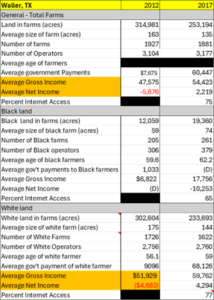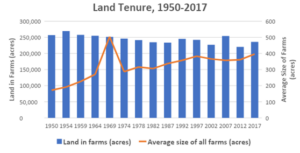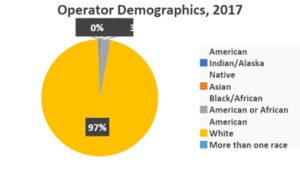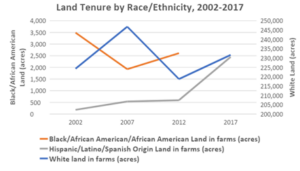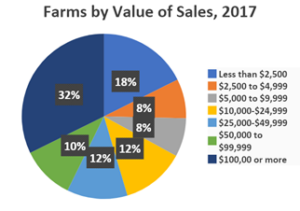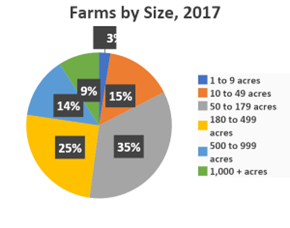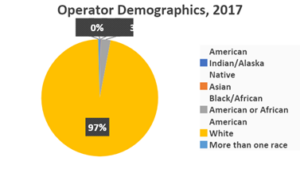Final report for LS21-356
Project Information
The principal investigator partners, North Carolina Association of Black Lawyers Land Loss Prevention Project (LLPP) and Rural Coalition (RC) coordinated the overall research and education planning, and administration of this SSARE project across the LLPP collaboration base and the RC’s membership, including cooperator groups (Operation Spring Plant, Oklahoma Black Historical Research Project, Inc., Rural Advancement Fund of the National Sharecroppers Fund, and Texas Coalition of Rural Landowners). During FY2021-2023, this entailed meeting with cooperators to pivot research and implementation approaches during the Pandemic and to consider emerging environmental, disaster, and federal program-related needs and opportunities (i.e., White House, Congressional and USDA programs ranging across HRSA, ARPA, IRA, DFAP, ERP and others).
Our findings related to heirs property, land acquisition, land loss, new/beginning (and transitioning) farmers, ranchers and forest landowners and sustainable agriculture were also timely as they informed policy recommendations such as federal comments, meetings with mayors across the Southern region, and our input to the USDA Equity Commission at a critical time. LLPP’s Executive Director contributed directly to that Commission’s recent final report as a member of the Agriculture Sub-Committee with critical contributions on: 1) providing non-loan options to prevent recurring heirs property dynamics in families; 2) increasing land access through funding of community-led land access and transition projects; 3) increasing funding for the Tenure, Ownership and Transition of Agricultural Land (TOTAL); and 4) providing funding for cooperative agreements with community-based organizations and ensuring that heirship studies are inclusive with the fractionation issues of Tribal communities. The Rural Coalition submitted vital comments on these topics as well.
The project, “Securing Land Tenure Rights for Heirs Property Owners,” was designed to increase farmers’, ranchers’ and communities’ awareness of the barriers presented by heirs property and to provide access to trusted community resources through adoption of innovations by peer farmers, cooperatives, landowner associations, and project partners on using these new tools to address these barriers. The goals, objectives, and approaches were rooted in the Diffusion of Innovations theories popularized by Everett Rogers, which highlight the importance of finding early adopters to demonstrate and model new practices, and of utilizing peer networks to disseminate new ideas more broadly and accelerate adoption.
Two key long-term change strategies observed by Rogers include: 1) a highly respected individual within a social network adopting an innovation and creating a broader desire for that innovation within the network; and 2) introducing an innovation into a group of individuals, such as a farmer cooperative or a network of service providers, to support adoption of the innovation. In cooperator meetings, interviews, focus groups, and farmer/ landowner meetings, we heard clearly that clearing heirs property status is key to planning and implementing sustainable agriculture practices, because land ownership must first be sustainable. As a result, the project activities built on farmer/ landowner input in the Discover Phase and utilized these two strategies in the Build and Educate Phases to spread knowledge and practices; and then supported a broader change network through the Evaluation and Dissemination Phases, as described below.
Discover: The team built on focus groups and leveraged project activities for ongoing input to support farmers/ landowners in securing land tenure, ensuring economic wellbeing, and improving the environmental quality of their operations and social benefits to the communities.
The full project team, with leadership from the farm team formed of the cooperating farmers, provided workshops in each area using LLPP’s “10 Ways to Save Your Land.” Participants across these communities were then invited to participate in confidential focus groups followed by a survey. Focus groups utilized various techniques including dot allocation to identify key factors and prioritize influential concepts on the impact of these issues for families in the community to inform the survey. The surveys, which protect the identity of the participants, focused on the experience of the farm families and gathered key demographic data and farm enterprise data. Taken together these informed surveys centered around land tenure and farming practices helped unveil how land tenure arrangements and new tools are influencing farming operation choices, sustainability, and succession.
All our partners leveraged decades of experience and made extensive use of participatory research and popular education methodologies in the project. We aligned our research, data collection, reporting, and dissemination strategies, looked back on what we have achieved in the past, and leveraged the research, the input from interviews and focus groups, and the information gathered during workshops, technical assistance sessions and other connections with farmers and landowners to keep improving the work as well as the tools for information sharing about successes and solutions.
We employed and assessed the following methods in our work:
- Baseline Surveying and Assessment
- Group-Based Training and Information Sharing
- Individualized Technical Assistance
- Leadership Development and Increased Capacity of our Farmer Mentoring Network
- Project Team Field Visits/Conferences
- Outreach and Communications
- Data Collection, Results/Outcomes-Based Reporting and Participatory
Evaluation
- Resource Sharing and Information Dissemination
Land Tenure is Key to Agricultural Sustainability
An early pivot in the project structure came about as a result of input gleaned during the Discover phase. Having heard clearly during the Discover phase that heirs property status is only one of multiple, intersecting and interconnected issues typically faced by historically underserved producers and landowners, the Land Tenure Specialist team activities were redesigned to round out the range of support needed to understand, stabilize and advance land tenure.
The Land Tenure Specialist’s proposed scope of work included preparation of training modules and delivery of workshops on land ownership records, title searches, deeds, court records, and how to preserve documents. In reaching out to potential project partners, the SARE project team learned that The Conservation Fund’s Resourceful Communities Program had secured USDA-Natural Resources Conservation Service funding to develop and deliver the same workshops. Since the Resourceful Communities workshop leads, Peg Kohring Cichon and McIntosh Sustainable Environment and Economic Development (McSEED), were able to reach the same target populations, the Land Tenure Specialist position was reconfigured to a team including Peg, McSEED, Mikki Sager (the original team member), Livia Marques and Savi Horne, all with extensive experience in working with farmers, landowners and communities. The scope of activities was broadened and deepened, to build on landowner input and lessons learned through the workshops, and to focus on the following impact areas, primarily in the Build and Educate categories:
- Technical Assistance: We provided technical assistance to producers, landowners, tribes and communities, including sharing information, providing one-on-one technical assistance to increase access to public dollars and providing direct connections to agencies, funding and other resources that have previously been functionally inaccessible.
- Policy: Farmer and landowner input helped to inform public policy suggestions and recommendations through participation in conferences, workshops, focus groups and individual interviews that enabled sharing of information gleaned through Discover phase, and learned from producers’ and partners’ lived and work experiences.
- Leveraging Resources: The public dollars available during the pandemic created opportunities for increasing access to funding, markets and other resources while also building skills and capacity for the long term, especially through network connections and new partnerships.
- Models: The resources available helped farmers and ranchers in developing models that are rooted in producers’ and landowners’ realities, are culturally informed and can influence future programming, policy development, and community and producer/ landowner efforts.
- Workshops: Hosting virtual and in-person workshops enabled producers and landowners to build skills; transfer knowledge about heirs property, estate planning, wills, trusts and LLCs; and build a base of trust for additional follow-up support to individuals and families.
Build: We built educational and policy materials and provided legal and technical assistance based on the recommendations and best practices to move producers to secured land tenure.
Based on input and insights gleaned during the Discover phase, the team developed additional questions and performed additional analysis using county level data from the Census of Agriculture, and on key concepts drawn from the broader literature. We employed this data to help each community develop insights on how to better structure outreach and technical assistance, and over time, to track results, by race, gender and ethnicity.
Workshops engaged farmers, ranchers, and landowners in target communities to develop specific recommendations on how heirs property related policy tools and educational materials are now working and how these can be improved to better meet the needs of farmers and communities. The focus was on how new farm bill policies related to heirs property, coupled with the Uniform Partition of Heirs Property Act (UPHPA) being adopted at the state level, can work to remove barriers to USDA program access, and help families address the difficult issues of family succession and benefit the community. The project activities were carried out with iterative and formative inputs informing adjustments to materials, updated alongside emerging business and ownership conditions and structures. Broadly, the project team carried out the following project activities, including:
- Outreach and Education: LLPP, RC, cooperator groups and Land Tenure Specialists hosted virtual and in-person workshops, shared materials developed in response to farmer/ landowner input, and made presentations at other entities’ gatherings, to build skills and transfer knowledge about sustainable agriculture, government programs, land tenure issues, heirs property, land acquisition/ rematriation, farm business opportunities and structures, legal structures, accessing public funding and more. We also developed professional development classes/ sessions to broaden the support and assistance network available to help historically underserved producers and landowners address sustainable agriculture production, conservation practices, heirs property and related land tenure and economic challenges; and build a trusted community of practice with skills and capacity to provide additional follow-up support to individuals and families.
- Legal Assistance: We heard, during the Discover phase, that farmers and landowners seldom have access to legal assistance they can trust, Project team partners provided access to, or direct legal and technical assistance to farmers, landowners, families, cooperatives, community-based organizations, and agriculturally-focused nonprofits, including sharing information; providing one-on-one legal assistance or technical support to address heirs property, foreclosure prevention, estate planning or other land tenure issues; helping families and groups of farmers/ landowners structure limited liability companies, agricultural and value-added food businesses, community farms and cooperatives/ collectives; and increasing access to public dollars and providing direct connections to agencies, funding and other resources that have previously been functionally inaccessible.
- Technical Assistance: Project team members provided a broad range of technical assistance to farmers, ranchers, landowners, tribal Nations, faith groups and community groups on sustainable agriculture, land tenure, land acquisition, government programs, and more. Topics and skills included but were not limited to: heirs property, risk management, climate smart agriculture, cover crops, wills, taxes, probates, partition sales, climate resiliency, debt relief, agricultural business plans, forming and operating cooperatives, USDA programs (DFAP, NAP, EQIP, Rural Development, etc.), the Farm Bill, and COVID-era funding opportunities.
- Leveraging Resources: We worked to help farmers, landowners, communities, tribes and other participants increase access to funding, markets and other resources as a means of building skills and capacity for the long term, especially through network and peer connections, new partnerships, and direct connections to agency professionals and public/ private funding sources.
- Supporting Models: We assisted farmers and landowners to develop operating models and legal/ business structures that are rooted in producers’ and landowners’ realities, are culturally informed and can influence farm operations, future programming, policy development, and community and producer/ landowner efforts.
Educate: We shared materials/ practices with farmers, extension agents, and communities, and grew the support network needed to adopt more ecologically and sustainable practices.
The educational materials and policy recommendations were shared with participating farmers, area extension agents, and policy makers for revisions and action. The partners tested materials during follow-up workshops, meetings and trainings using modules that were tested and evaluated by the Farm Team and during the trainings, and were revised, updated and shared with others for final review, including at the annual Winter Forum of the Rural Coalition, and at the trainings held annually by Oklahoma Black Historical Research Project and Operation Spring Plant.
- Workshops: We hosted virtual and in-person workshops to build skills, transfer knowledge, and build a base of trust for additional follow-up support to individuals, families, communities, faith groups, tribal governments and Native entities.
SUMMARY TALLY OF CRITICAL PROJECT ACTIVITIES AND OUTPUTS
Over the course of the extended three-year project period, the project team engaged in the following activities and produced the results tallied below:
Outreach and Education: 8,924 individuals participated in 184 virtual and in-person workshops, including historically underserved, socially disadvantaged farmers/ ranchers/ homeowner farmers/ small-acreage farmers/ landowners/ women and veteran producers, as well as community leaders and members; land, racial justice and elder abuse prevention advocates; senior and disabled homeowners, caregivers and service providers; homeowners with forestland; FSA and agricultural and rural leaders; legal practitioners and advocates for farmers and homeowners; local and statewide service providers in healthcare, emergency services, home restoration, agricultural services, education, law; conservation finance, agency and philanthropic leaders; students and academics in agriculture, law and conservation; small business owners; local and regional government leaders.
Over 12,000 packets of educational materials were distributed, with thousands more individual educational documents being distributed during the three-year project period. In addition to updating “Ten Ways to Save Your Land,” the LLPP team created and distributed 105 copies of a special activity book on estate planning for children, in response to input about the need to educate and meaningfully engage future generations around land tenure. Topics addressed included: heirs property, estate planning, wills preparation, foreclosure prevention, disaster preparedness/ relief/ recovery, farm business entity formation, cooperatives, and more. Virtual and in-person workshop participants included 34 producers, 452 individual landowners, and over 150 community leaders from throughout North Carolina, South Carolina, Georgia and Alabama. An additional 6 historically underserved community groups developed plans and accessed funding through support in developing community-led food system models.
Legal Assistance: A broad range of legal and technical assistance was provided, with 1,246 legal matters addressed in 77 of North Carolina’s 100 counties, including the most socially and economically distressed counties. These included: 210 lending and finance-related matters, including debt restructuring, consumer issues, and foreclosure defense, including bankruptcy; 367 real property matters such as adverse possession, boundary disputes and heirs property; 77 agricultural business issues including rural economic development, incorporation, tax-exempt status support, land use, environmental issues and miscellaneous matters such as tenancy; 71 civil and individual rights matters, including issues involving the USDA; and support to 521 individuals/families on preparing wills and estate planning. The legal and technical assistance in North Carolina preserved land, homes and farms with a tax value of $6,629,430, retaining generational wealth and critical assets for families in need and protecting farms and agricultural businesses.
Technical Assistance: A broad range of technical assistance was provided to over 630 farmers and ranchers who all qualify as socially disadvantaged, beginning/ young, historically underserved, women, and/ or veteran. Skills built and topics covered included, but were now limited to: securing farm numbers, financial recordkeeping, applying for reduced taxation programs, coaching and assistance in preparing EQIP applications, beekeeping and pollinator pathways, climate smart agriculture, cover crops, registering to supply vegetables under the USDA Local Food for School Cooperative Agreement Program, learning about preferences that veterans are eligible for, accessing new markets such as selling cotton to Cargill via the Black Equity Program, securing high tunnels and rainwater harvesting equipment funding, protecting inherited land via a land trust, and more. Additional assistance was provided to 96 individual landowners and 8 landowner families comprising more than 85 individuals; one federally recognized tribal nation; and at least four excluded communities/ historically underserved community- based organizations (CBOs).
Leveraging Resources: In addition to the project lead organizations raising $10 million in federal funding for outreach services, and sustainable agriculture business support, we also helped partner farmers and communities raise over $4.7 million to advance sustainable agriculture, strengthen farm and cooperative operations, access new markets, secure farm equipment and more. This included supporting the efforts of 6 tribes, 8 rural food hubs and three community-based organizations secure over $3.75 million in funding to support general operations, land acquisition, food businesses, local food systems and more; plus assisting 4 Texas landowners in obtaining $224,000 in grants to purchase new farming equipment via the Texas Commission on Environmental Quality; and we supported 3 farmers and one market cooperative in securing over $700,000 to strengthen operations and increase access to new markets.
Supporting Models: Project team members provided support to cooperatives and collectives supporting more than 260 historically underserved and socially disadvantaged farmers/ landowners/ value-added food processors in strengthening their operations, increasing revenues, increasing access to public and private funding, increasing access to public conservation programs and implementing sustainable agriculture practices. We were instrumental in assisting BIPOC collaboratives and networks in securing over $700,000 that was distributed to historically underserved, socially disadvantaged, young, beginning, women and veteran farmers and landowners to strengthen agriculturally-based businesses, and to establish an East Coast agroecology center serving the Southern Black Belt. Likewise, our collaborative advocacy framework resulted in the NC Department of Agriculture securing millions of federal dollars to increase food access in communities and schools throughout the state, while working with underserved farmers to help them access produce markets locally and across the state. An additional 94 individual producers strengthened their operations through increased access to markets, support to producer cooperatives, and access to shared equipment.
Informing Policy: The project team members shared information gleaned from the Discover Phase and throughout the project period to both inform and support public policy regarding land tenure, agricultural production, access to capital and markets, and more. In several cases, LLPP provided direct support to heirs property owners who were being denied COVID relief housing assistance funds because individual names were not on the real property deeds. LLPP documented the legal basis for the funding to be awarded. At the same time, LLPP engaged in shaping with policy collaborators the American Rescue Plan Act (ARP) and bringing to fruition the land access program which provided transformational capital to three community-based nonprofits to assist BIPOC farmers; served on the Agriculture Committee of the USDA Equity Commission; and, in the 2023-23 grant period, contributed to the interim report that recommended enhanced diversity across USDA, furthered opportunities for people of color, and addressing of discrimination. Project team members also provided thought partnership, input and policy recommendations to Federal Reserve Board, USDA-Forest Service, Albemarle-Pamlico National Estuary Partnership, and national intermediaries (The Wilderness Society, Environmental Defense Fund, Aspen Institute), regarding land/ food/ economic/ environmental/ climate challenges. Additional policy recommendations provided by RC are noted below:
- (2022 - Letter to Chairman Bishop and Ranking Member Fortenberry:)
- (i) Relending Program To Resolve Ownership And Succession On Farmland. Under Section 5104 of the 2018 Farm Bill, the Congress authorized a new USDA Farm Service Agency intermediary relending pilot program to resolve heirs’ property issues that cloud title to agricultural lands and prevent participation in critical USDA programs. The Revolving Loan pilot authorized under Section 5104 permits USDA loans to heirs property interest holders for the purpose of purchasing the interests of non-farming heirs who desire to sell their interest to family members intending to actively farm the land.
- Section 5104 authorizes an appropriation up to $10 million annually. We request the committee provide the full $10 million for FY 2020 in order to allow the Secretary to initiate and establish 3(three) or more pilot relending programs to best assess different methods and models for relending, and best inform a report with recommendations for improvement and continuation.
- (ii) Farmland Ownership Data Collection. Section 12607 of the 2018 Farm Bill created the Farmland Ownership Data Collection initiative with the specific charge of capturing data trends in farmland (a) ownership, (b) tenure, (c) generational transitions, (d) and barriers to entry for beginning and socially disadvantaged farmers and ranchers. The data and studies compiled under Section 12607 can be used to inform and guide all levels of agricultural policymaking that concern the critical dynamics of heirs’ property and absentee land ownership in farming communities. Further, we recommend an appropriation of $3 million in FY 2020 in order to implement the collection of data that supports the need for a robust and viable plan for the efficient transition of farmland to the next generation of farmers and ranchers.
Evaluate: Research findings and metrics were documented and informed development of new materials, business models and operating structures to strengthen production and land tenure.
Research findings and metrics are reported above and below, including numbers of farmers and communities reached, number of wills completed, and the outcomes of heirs property representation provided, including use of the UPHPA.
The team also shared for review with extension personnel and policy makers a report analyzing the view of farmers and communities of the efficacy of new policy tools coupled with training modules to return dormant land to farming and pass it on to new generations, and otherwise affect the ecological status, economic well-being and quality of life of the farmer, her/his family, and the community. The efficacy of the materials produced will be evaluated using a pretest/post-test design and amended for final dissemination.
The team will further assess the extent to which new farm bill policies related to heirs property, coupled with the Uniform Partition of Heirs Property Act being adopted at the state level, are functioning to remove barriers to USDA program access, and enabling families to address the complex issues of family succession in the farming vocation.
Disseminate: Educational materials and policy proposals were made available to producers, extension agents, advocates, support groups, key policy makers.
Educational material and policy proposals have been made available for producers, partner organizations and related CBO networks, and extension agents nationwide, on websites, in annual meetings held by each group and distributed to and discussed with key policy makers.
See Additional Attachments:
Not applicable. Project Objectives remained as orginally proposed:
- Discover: The team will develop an in-depth understanding of the experience of farming communities and families in addressing farm succession issues, and how new farm bill policies related to heirs property and related state laws, are working to remove barriers to USDA program access and return dormant land to production.
- Build: Using findings, the team will engage communities to develop recommendations on improving heirs property policies and educational materials to better meet the needs of farmers and communities
- Educate: Materials and Recommendations will be refined with participating farmers and area extension agents.
- Evaluate: Materials refined are evaluated for final dissemination.
- Disseminate: Educational material and policy proposals will be made available to producers and extension agents nationwide and key policy makers.
Cooperators
- - Producer
- - Producer
- - Producer
- - Producer
- - Producer
Research
Copied & Pasted from Abstract Section:
The principal investigator partners, North Carolina Association of Black Lawyers Land Loss Prevention Project (LLPP) and Rural Coalition (RC) coordinated the overall research and education planning, and administration of this SSARE project across the LLPP collaboration base and the RC’s membership, including cooperator groups (Operation Spring Plant, Oklahoma Black Historical Research Project, Inc., Rural Advancement Fund of the National Sharecroppers Fund, and Texas Coalition of Rural Landowners). During FY2021-2023, this entailed meeting with cooperators to pivot research and implementation approaches during the Pandemic and to consider emerging environmental, disaster, and federal program-related needs and opportunities (i.e., White House, Congressional and USDA programs ranging across HRSA, ARPA, IRA, DFAP, ERP and others).
Our findings related to heirs property, land acquisition, land loss, new/beginning (and transitioning) farmers, ranchers and forest landowners and sustainable agriculture were also timely as they informed policy recommendations such as federal comments, meetings with mayors across the Southern region, and our input to the USDA Equity Commission at a critical time. LLPP’s Executive Director contributed directly to that Commission’s recent final report as a member of the Agriculture Sub-Committee with critical contributions on: 1) providing non-loan options to prevent recurring heirs property dynamics in families; 2) increasing land access through funding of community-led land access and transition projects; 3) increasing funding for the Tenure, Ownership and Transition of Agricultural Land (TOTAL); and 4) providing funding for cooperative agreements with community-based organizations and ensuring that heirship studies are inclusive with the fractionation issues of Tribal communities. The Rural Coalition submitted vital comments on these topics as well.
The project, “Securing Land Tenure Rights for Heirs Property Owners,” was designed to increase farmers’, ranchers’ and communities’ awareness of the barriers presented by heirs property and to provide access to trusted community resources through adoption of innovations by peer farmers, cooperatives, landowner associations, and project partners on using these new tools to address these barriers. The goals, objectives, and approaches were rooted in the Diffusion of Innovations theories popularized by Everett Rogers, which highlight the importance of finding early adopters to demonstrate and model new practices, and of utilizing peer networks to disseminate new ideas more broadly and accelerate adoption.
Two key long-term change strategies observed by Rogers include: 1) a highly respected individual within a social network adopting an innovation and creating a broader desire for that innovation within the network; and 2) introducing an innovation into a group of individuals, such as a farmer cooperative or a network of service providers, to support adoption of the innovation. In cooperator meetings, interviews, focus groups, and farmer/ landowner meetings, we heard clearly that clearing heirs property status is key to planning and implementing sustainable agriculture practices, because land ownership must first be sustainable. As a result, the project activities built on farmer/ landowner input in the Discover Phase and utilized these two strategies in the Build and Educate Phases to spread knowledge and practices; and then supported a broader change network through the Evaluation and Dissemination Phases, as described below.
Discover: The team built on focus groups and leveraged project activities for ongoing input to support farmers/ landowners in securing land tenure, ensuring economic wellbeing, and improving the environmental quality of their operations and social benefits to the communities.
The full project team, with leadership from the farm team formed of the cooperating farmers, provided workshops in each area using LLPP’s “10 Ways to Save Your Land.” Participants across these communities were then invited to participate in confidential focus groups followed by a survey. Focus groups utilized various techniques including dot allocation to identify key factors and prioritize influential concepts on the impact of these issues for families in the community to inform the survey. The surveys, which protect the identity of the participants, focused on the experience of the farm families and gathered key demographic data and farm enterprise data. Taken together these informed surveys centered around land tenure and farming practices helped unveil how land tenure arrangements and new tools are influencing farming operation choices, sustainability, and succession.
All our partners leveraged decades of experience and made extensive use of participatory research and popular education methodologies in the project. We aligned our research, data collection, reporting, and dissemination strategies, looked back on what we have achieved in the past, and leveraged the research, the input from interviews and focus groups, and the information gathered during workshops, technical assistance sessions and other connections with farmers and landowners to keep improving the work as well as the tools for information sharing about successes and solutions.
We employed and assessed the following methods in our work:
- Baseline Surveying and Assessment
- Group-Based Training and Information Sharing
- Individualized Technical Assistance
- Leadership Development and Increased Capacity of our Farmer Mentoring Network
- Project Team Field Visits/Conferences
- Outreach and Communications
- Data Collection, Results/Outcomes-Based Reporting and Participatory
Evaluation
- Resource Sharing and Information Dissemination
Land Tenure is Key to Agricultural Sustainability
An early pivot in the project structure came about as a result of input gleaned during the Discover phase. Having heard clearly during the Discover phase that heirs property status is only one of multiple, intersecting and interconnected issues typically faced by historically underserved producers and landowners, the Land Tenure Specialist team activities were redesigned to round out the range of support needed to understand, stabilize and advance land tenure.
The Land Tenure Specialist’s proposed scope of work included preparation of training modules and delivery of workshops on land ownership records, title searches, deeds, court records, and how to preserve documents. In reaching out to potential project partners, the SARE project team learned that The Conservation Fund’s Resourceful Communities Program had secured USDA-Natural Resources Conservation Service funding to develop and deliver the same workshops. Since the Resourceful Communities workshop leads, Peg Kohring Cichon and McIntosh Sustainable Environment and Economic Development (McSEED), were able to reach the same target populations, the Land Tenure Specialist position was reconfigured to a team including Peg, McSEED, Mikki Sager (the original team member), Livia Marques and Savi Horne, all with extensive experience in working with farmers, landowners and communities. The scope of activities was broadened and deepened, to build on landowner input and lessons learned through the workshops, and to focus on the following impact areas, primarily in the Build and Educate categories:
- Technical Assistance: We provided technical assistance to producers, landowners, tribes and communities, including sharing information, providing one-on-one technical assistance to increase access to public dollars and providing direct connections to agencies, funding and other resources that have previously been functionally inaccessible.
- Policy: Farmer and landowner input helped to inform public policy suggestions and recommendations through participation in conferences, workshops, focus groups and individual interviews that enabled sharing of information gleaned through Discover phase, and learned from producers’ and partners’ lived and work experiences.
- Leveraging Resources: The public dollars available during the pandemic created opportunities for increasing access to funding, markets and other resources while also building skills and capacity for the long term, especially through network connections and new partnerships.
- Models: The resources available helped farmers and ranchers in developing models that are rooted in producers’ and landowners’ realities, are culturally informed and can influence future programming, policy development, and community and producer/ landowner efforts.
- Workshops: Hosting virtual and in-person workshops enabled producers and landowners to build skills; transfer knowledge about heirs property, estate planning, wills, trusts and LLCs; and build a base of trust for additional follow-up support to individuals and families.
Build: We built educational and policy materials and provided legal and technical assistance based on the recommendations and best practices to move producers to secured land tenure.
Based on input and insights gleaned during the Discover phase, the team developed additional questions and performed additional analysis using county level data from the Census of Agriculture, and on key concepts drawn from the broader literature. We employed this data to help each community develop insights on how to better structure outreach and technical assistance, and over time, to track results, by race, gender and ethnicity.
Workshops engaged farmers, ranchers, and landowners in target communities to develop specific recommendations on how heirs property related policy tools and educational materials are now working and how these can be improved to better meet the needs of farmers and communities. The focus was on how new farm bill policies related to heirs property, coupled with the Uniform Partition of Heirs Property Act (UPHPA) being adopted at the state level, can work to remove barriers to USDA program access, and help families address the difficult issues of family succession and benefit the community. The project activities were carried out with iterative and formative inputs informing adjustments to materials, updated alongside emerging business and ownership conditions and structures. Broadly, the project team carried out the following project activities, including:
- Outreach and Education: LLPP, RC, cooperator groups and Land Tenure Specialists hosted virtual and in-person workshops, shared materials developed in response to farmer/ landowner input, and made presentations at other entities’ gatherings, to build skills and transfer knowledge about sustainable agriculture, government programs, land tenure issues, heirs property, land acquisition/ rematriation, farm business opportunities and structures, legal structures, accessing public funding and more. We also developed professional development classes/ sessions to broaden the support and assistance network available to help historically underserved producers and landowners address sustainable agriculture production, conservation practices, heirs property and related land tenure and economic challenges; and build a trusted community of practice with skills and capacity to provide additional follow-up support to individuals and families.
- Legal Assistance: We heard, during the Discover phase, that farmers and landowners seldom have access to legal assistance they can trust, Project team partners provided access to, or direct legal and technical assistance to farmers, landowners, families, cooperatives, community-based organizations, and agriculturally-focused nonprofits, including sharing information; providing one-on-one legal assistance or technical support to address heirs property, foreclosure prevention, estate planning or other land tenure issues; helping families and groups of farmers/ landowners structure limited liability companies, agricultural and value-added food businesses, community farms and cooperatives/ collectives; and increasing access to public dollars and providing direct connections to agencies, funding and other resources that have previously been functionally inaccessible.
- Technical Assistance: Project team members provided a broad range of technical assistance to farmers, ranchers, landowners, tribal Nations, faith groups and community groups on sustainable agriculture, land tenure, land acquisition, government programs, and more. Topics and skills included but were not limited to: heirs property, risk management, climate smart agriculture, cover crops, wills, taxes, probates, partition sales, climate resiliency, debt relief, agricultural business plans, forming and operating cooperatives, USDA programs (DFAP, NAP, EQIP, Rural Development, etc.), the Farm Bill, and COVID-era funding opportunities.
- Leveraging Resources: We worked to help farmers, landowners, communities, tribes and other participants increase access to funding, markets and other resources as a means of building skills and capacity for the long term, especially through network and peer connections, new partnerships, and direct connections to agency professionals and public/ private funding sources.
- Supporting Models: We assisted farmers and landowners to develop operating models and legal/ business structures that are rooted in producers’ and landowners’ realities, are culturally informed and can influence farm operations, future programming, policy development, and community and producer/ landowner efforts.
Educate: We shared materials/ practices with farmers, extension agents, and communities, and grew the support network needed to adopt more ecologically and sustainable practices.
The educational materials and policy recommendations were shared with participating farmers, area extension agents, and policy makers for revisions and action. The partners tested materials during follow-up workshops, meetings and trainings using modules that were tested and evaluated by the Farm Team and during the trainings, and were revised, updated and shared with others for final review, including at the annual Winter Forum of the Rural Coalition, and at the trainings held annually by Oklahoma Black Historical Research Project and Operation Spring Plant.
- Workshops: We hosted virtual and in-person workshops to build skills, transfer knowledge, and build a base of trust for additional follow-up support to individuals, families, communities, faith groups, tribal governments and Native entities.
SUMMARY TALLY OF CRITICAL PROJECT ACTIVITIES AND OUTPUTS
Over the course of the extended three-year project period, the project team engaged in the following activities and produced the results tallied below:
Outreach and Education: 8,924 individuals participated in 184 virtual and in-person workshops, including historically underserved, socially disadvantaged farmers/ ranchers/ homeowner farmers/ small-acreage farmers/ landowners/ women and veteran producers, as well as community leaders and members; land, racial justice and elder abuse prevention advocates; senior and disabled homeowners, caregivers and service providers; homeowners with forestland; FSA and agricultural and rural leaders; legal practitioners and advocates for farmers and homeowners; local and statewide service providers in healthcare, emergency services, home restoration, agricultural services, education, law; conservation finance, agency and philanthropic leaders; students and academics in agriculture, law and conservation; small business owners; local and regional government leaders.
Over 12,000 packets of educational materials were distributed, with thousands more individual educational documents being distributed during the three-year project period. In addition to updating “Ten Ways to Save Your Land,” the LLPP team created and distributed 105 copies of a special activity book on estate planning for children, in response to input about the need to educate and meaningfully engage future generations around land tenure. Topics addressed included: heirs property, estate planning, wills preparation, foreclosure prevention, disaster preparedness/ relief/ recovery, farm business entity formation, cooperatives, and more. Virtual and in-person workshop participants included 34 producers, 452 individual landowners, and over 150 community leaders from throughout North Carolina, South Carolina, Georgia and Alabama. An additional 6 historically underserved community groups developed plans and accessed funding through support in developing community-led food system models.
Legal Assistance: A broad range of legal and technical assistance was provided, with 1,246 legal matters addressed in 77 of North Carolina’s 100 counties, including the most socially and economically distressed counties. These included: 210 lending and finance-related matters, including debt restructuring, consumer issues, and foreclosure defense, including bankruptcy; 367 real property matters such as adverse possession, boundary disputes and heirs property; 77 agricultural business issues including rural economic development, incorporation, tax-exempt status support, land use, environmental issues and miscellaneous matters such as tenancy; 71 civil and individual rights matters, including issues involving the USDA; and support to 521 individuals/families on preparing wills and estate planning. The legal and technical assistance in North Carolina preserved land, homes and farms with a tax value of $6,629,430, retaining generational wealth and critical assets for families in need and protecting farms and agricultural businesses.
Technical Assistance: A broad range of technical assistance was provided to over 630 farmers and ranchers who all qualify as socially disadvantaged, beginning/ young, historically underserved, women, and/ or veteran. Skills built and topics covered included, but were now limited to: securing farm numbers, financial recordkeeping, applying for reduced taxation programs, coaching and assistance in preparing EQIP applications, beekeeping and pollinator pathways, climate smart agriculture, cover crops, registering to supply vegetables under the USDA Local Food for School Cooperative Agreement Program, learning about preferences that veterans are eligible for, accessing new markets such as selling cotton to Cargill via the Black Equity Program, securing high tunnels and rainwater harvesting equipment funding, protecting inherited land via a land trust, and more. Additional assistance was provided to 96 individual landowners and 8 landowner families comprising more than 85 individuals; one federally recognized tribal nation; and at least four excluded communities/ historically underserved community- based organizations (CBOs).
Leveraging Resources: In addition to the project lead organizations raising $10 million in federal funding for outreach services, and sustainable agriculture business support, we also helped partner farmers and communities raise over $4.7 million to advance sustainable agriculture, strengthen farm and cooperative operations, access new markets, secure farm equipment and more. This included supporting the efforts of 6 tribes, 8 rural food hubs and three community-based organizations secure over $3.75 million in funding to support general operations, land acquisition, food businesses, local food systems and more; plus assisting 4 Texas landowners in obtaining $224,000 in grants to purchase new farming equipment via the Texas Commission on Environmental Quality; and we supported 3 farmers and one market cooperative in securing over $700,000 to strengthen operations and increase access to new markets.
Supporting Models: Project team members provided support to cooperatives and collectives supporting more than 260 historically underserved and socially disadvantaged farmers/ landowners/ value-added food processors in strengthening their operations, increasing revenues, increasing access to public and private funding, increasing access to public conservation programs and implementing sustainable agriculture practices. We were instrumental in assisting BIPOC collaboratives and networks in securing over $700,000 that was distributed to historically underserved, socially disadvantaged, young, beginning, women and veteran farmers and landowners to strengthen agriculturally-based businesses, and to establish an East Coast agroecology center serving the Southern Black Belt. Likewise, our collaborative advocacy framework resulted in the NC Department of Agriculture securing millions of federal dollars to increase food access in communities and schools throughout the state, while working with underserved farmers to help them access produce markets locally and across the state. An additional 94 individual producers strengthened their operations through increased access to markets, support to producer cooperatives, and access to shared equipment.
Informing Policy: The project team members shared information gleaned from the Discover Phase and throughout the project period to both inform and support public policy regarding land tenure, agricultural production, access to capital and markets, and more. In several cases, LLPP provided direct support to heirs property owners who were being denied COVID relief housing assistance funds because individual names were not on the real property deeds. LLPP documented the legal basis for the funding to be awarded. At the same time, LLPP engaged in shaping with policy collaborators the American Rescue Plan Act (ARP) and bringing to fruition the land access program which provided transformational capital to three community-based nonprofits to assist BIPOC farmers; served on the Agriculture Committee of the USDA Equity Commission; and, in the 2023-23 grant period, contributed to the interim report that recommended enhanced diversity across USDA, furthered opportunities for people of color, and addressing of discrimination. Project team members also provided thought partnership, input and policy recommendations to Federal Reserve Board, USDA-Forest Service, Albemarle-Pamlico National Estuary Partnership, and national intermediaries (The Wilderness Society, Environmental Defense Fund, Aspen Institute), regarding land/ food/ economic/ environmental/ climate challenges. Additional policy recommendations provided by RC are noted below:
- (2022 - Letter to Chairman Bishop and Ranking Member Fortenberry:)
- (i) Relending Program To Resolve Ownership And Succession On Farmland. Under Section 5104 of the 2018 Farm Bill, the Congress authorized a new USDA Farm Service Agency intermediary relending pilot program to resolve heirs’ property issues that cloud title to agricultural lands and prevent participation in critical USDA programs. The Revolving Loan pilot authorized under Section 5104 permits USDA loans to heirs property interest holders for the purpose of purchasing the interests of non-farming heirs who desire to sell their interest to family members intending to actively farm the land.
- Section 5104 authorizes an appropriation up to $10 million annually. We request the committee provide the full $10 million for FY 2020 in order to allow the Secretary to initiate and establish 3(three) or more pilot relending programs to best assess different methods and models for relending, and best inform a report with recommendations for improvement and continuation.
- (ii) Farmland Ownership Data Collection. Section 12607 of the 2018 Farm Bill created the Farmland Ownership Data Collection initiative with the specific charge of capturing data trends in farmland (a) ownership, (b) tenure, (c) generational transitions, (d) and barriers to entry for beginning and socially disadvantaged farmers and ranchers. The data and studies compiled under Section 12607 can be used to inform and guide all levels of agricultural policymaking that concern the critical dynamics of heirs’ property and absentee land ownership in farming communities. Further, we recommend an appropriation of $3 million in FY 2020 in order to implement the collection of data that supports the need for a robust and viable plan for the efficient transition of farmland to the next generation of farmers and ranchers.
Evaluate: Research findings and metrics were documented and informed development of new materials, business models and operating structures to strengthen production and land tenure.
Research findings and metrics are reported above and below, including numbers of farmers and communities reached, number of wills completed, and the outcomes of heirs property representation provided, including use of the UPHPA.
The team also shared for review with extension personnel and policy makers a report analyzing the view of farmers and communities of the efficacy of new policy tools coupled with training modules to return dormant land to farming and pass it on to new generations, and otherwise affect the ecological status, economic well-being and quality of life of the farmer, her/his family, and the community. The efficacy of the materials produced will be evaluated using a pretest/post-test design and amended for final dissemination.
The team will further assess the extent to which new farm bill policies related to heirs property, coupled with the Uniform Partition of Heirs Property Act being adopted at the state level, are functioning to remove barriers to USDA program access, and enabling families to address the complex issues of family succession in the farming vocation.
Disseminate: Educational materials and policy proposals were made available to producers, extension agents, advocates, support groups, key policy makers.
Educational material and policy proposals have been made available for producers, partner organizations and related CBO networks, and extension agents nationwide, on websites, in annual meetings held by each group and distributed to and discussed with key policy makers.
See prevoiusly referenced Attachement: Attachment 1 - 2021 - 2024 - SARE LS21-356 Final Report Tally
Research and Information Products
- Heirs Property Guide for Communities (updated 2022, 2023)
- 10 Ways to Save Your Land (Updated with LLPP 2022)
- RC Community Profiles with County Level Data
- AFRI Report to Partners (2022)
- Workshops on How to Buy Land
- Tribal Partner Workshops
With respect to farmer-led data analysis in 2022, RC provided NASS County and Race/Ethnicity/ Gender County profiles (2012 and 2017) to cooperators during the planning and “discover” stages of this project. As our work advanced, RC created a template for community (county-level) profiles with special attention to variations in changes in the overall, average, and median acreages of land held in each county by race and ethnicity. We used Orangeburg, SC as our first example, because we had compiled data back to the 1959 Census of Agriculture that allowed us to better understand changes in the total amount of land in agriculture in the county over time. RC also included data on other production and economic differences and how these changed across all data-collection periods compared with national trends. The RC Research Team completed similar profiles and reviewed county and area-specific profiles with each cooperator. (RC also aggregated and included county-level data from the Social Vulnerability Index from the Centers for Disease Control and USDA data on poverty, Internet access, and several related questions.)
In October 2022, RC generated a report to CBO partners working in either the AFRI or SARE projects. The report employed existing NASS data and interpreted quantitative and qualitative results of the AFRI survey, which was piloted alongside outreach and TA events (focused on land tenure, heirs property, encumbrances, recordkeeping, wills, leases) in Alabama with Cottage House and Oklahoma with OBHRPI. (Qualtrics was used to document and analyze survey pilot data.) This report was reviewed with 18 partners, enabling us to understand trends, especially in areas where data is unavailable (because of privacy of information concerns, lack of participation in USDA, lack of trust) and to hone our farmer-led research methodologies.
This final report discusses how community-specific methodologies were identified, disseminated, and evolved across the research period. It also includes data from partner and participant interviews.
FY2022 Research Timeline
- Rural Coalition staff revised a briefer version of the survey in collaboration with the Farm Advisory Team as a “screening tool,” which was administered twice during the month of August by Rural Coalition and organizational partner, Cottage House, Inc. in the state of Alabama.
- Thirty-nine (39) participants completed the survey during a meeting hosted by Cottage House, or at the follow-up weekend workshop hosted with the Ma-Chis Lower Creek Indian Tribe of Alabama during the first week of August. An attorney was present to answer questions about heirs property and legal encumbrances.
- RC staff entered data from these two surveys into Qualtrics, performed a rough analysis of the data utilizing capacities and expertise with the newly expanded Recordkeeping Team, and conducted an interview with CHI director about the results.
- RC updated the Qualtrics data management software to include SPSS, standard regression, and other statistical analysis tools.
- In October, RC produced a 24-page report [submitted with this report as an additional document] for research partners to examine and discuss key learnings, changes, and challenges and to enable collaborators to determine together the most productive way to advance the next research stage, including administering a shorter version of the survey and revising our focus group methodology if needed. The report also raises for discussion the significance of certain questions and how this can be better conveyed to participants. For example, the report raises why gender should not be omitted and why race/ethnicity data are incredibly valuable to USDA, Congress, and policymakers.
- Report summary: The purpose of the report to the research partners was and continues to inform a thoughtful review with AFRI research partners and farm advisory team members. NASS and related census data, especially County, State and REG (Race, Ethnicity, Gender) Profiles to shed light on the current results including Characteristics of the Farmer; the Characteristics of the Farm; Participation in USDA Programs; Record Keeping, Risk Management, Natural Resource Rights; and Family, Heirs Property and Community Change. Subsections focused on farmer data primarily from farmer respondents and data from all participating landowners, both farmers and non-farmers. Each sub-section concluded with a discussion of research considerations, such as the quality of the data collected with this instrument and suggestions for overcoming challenges to its interpretation. A series of tables presented data collected in the 2004-2005 Record Keeping Survey with 1000 Minority Farmers to compare with the current effort. The report also presents a slightly revised focus group protocol and an appendix with an evaluation table from the prior study and current evaluation questions.
- In the review of results with Cottage House (by phone interview on 8/22/22), we also captured emerging methodologies such as the “Do you know your land? The Walking Interview Assessment” employed by Mrs. Barbara Shipman. This walk is an informal, physical survey of the farm with the owner/s, which often culminates in a review of existing documents and a discussion of what is in them. Mrs. Shipman finds that many farmers with whom CHI works discover “old-time deeds” with buried clauses that prevent the sale of land and/or mineral and other rights, and that increase vulnerability to fracking and other predatory schemes. CHI is eager for the next stage of research to identify these and other encumbrances at a more granular level as described in objective three.
- The Report to Partners was shared with LLPP in preparation for the meeting reported under objective 2 and is currently being updated to include data insights from the survey conducted in Oklahoma in November and a follow up review with OBHRPI.
- A version of the survey containing many of the 2007 questions as well as new questions was piloted by the Oklahoma Black Historical Research Project, Inc. in July 2022 and determined to be too long for participants to complete fully in a reasonable amount of time. The survey was honed to 69 questions and readministered with a smaller group of 12 participants (all with farmland ownership, 9 farmers) in November 2022. These respondents participated in a meeting and nearly all survey questions were answered.
- Rural Coalition’s 14th Annual Winter Policy and Research Forum that was initially scheduled for December 2022, was conducted from January 19 to 20th. This meeting gathered more than 200 participants, including RC members, farmers, USDA staff and officials, and touched on many of the project’s research themes. 9 of the 11 CBO Research partners who were present determined that a review of the Forum would assist in framing the final phase of the AFRI and SSARE research projects to achieve overlapping objectives.
Insights from Interviews and 2022 Census Review: In 2024, Texas continues to have the most black farmers; Oklahoma SDFR farms have largely cow-calf operations, because of the lower quality of land, drought has been the primary challenge over the 2022-2024 period; South Carolina has historically and currently has a preponderance of row crop farmers, where interviews and outreach confirm that elder farmers want to "keep land from becoming heirs property." When asked what motivates SDFRs to resolve heirs property, farm community leaders said that it is the ability to make their operations more sustainable and participate in farm programs.
When asked to define or describe sustainability, one farm leader and SARE cooperator/partner said that the ability to hold on to the land (pay bills and taxes), take care of the land (conservation), and pass the land to future generations (family and new and beginning farmers) are the three most important things to a Socially-disadvantaged farmer, rancher or landowner, forest landowner who is often an elder.
Profitability is defined as “making enough” to do these things. Not making enough accelerates land loss and the loss of farmers in these communities. “No one [young] can make enough.”
And the “Land Grant Institutions (1890s and otherwise) are phasing out education for what I call ‘dirt farmers’, instead they are focusing on Agribusiness and other careers, so nobody wants to or knows how to farm.”
During 2022 and throughout 2023, it was called to our attention that producers were being approached by notaries and other such entities. These entities told (and continue to tell) farmers, ranchers, and landowners that they can help them receive USDA farm program benefits. Farmers and landowners are asked to complete a Power of Attorney (PoA) form granting the entity authority to conduct USDA business on their behalf. The grantees who receive this authority then apply for certain benefits on behalf of the farmer. The entities have an additional agreement with the farmer, often unwritten, to take a cut, ranging from 10-30%, of any benefits the farmer receives. The producers are not informed there is no cost for USDA services. After joining the meeting with Mayors across the Southeast to explain the issues of heirs property, the need for the Uniform Partition of Heirs Property Act at the state level and its implementation where it has been passed (e.g. Texas) became evident.
Supporting Cottage House’s heirs property training, focus groups and survey administration in 2022 and learning about their approach to TA, RC created a Partners Community Report on County Level Data (Pilot Survey Results), reviewed the report and pilot survey in a meeting with 18 partners (CBO staff and farm leaders, researchers, co-PIs), revised the pilot survey and contributed to the 2023 updated Community Guide with LLPP. The RC review of data with cooperators assists the collaborative effort between cooperators, farmer and rural communities, and USDA by examining the trends across counties, states, regions and the nation as well as programmatic needs and emergent concerns.
When the 2022 Ag Census was released on Feb 15, 2024, RC worked with NASS to acquire data for the counties of work in this project. The RC filtered this data to share with cooperators during the reporting interviews and intake sessions for this report.
SSARE NARRATIVES BY COUNTY
INTRODUCTION
This research looks at land tenure trends down to the county level and examines what NASS data related to demographics and farm economics (government payments, gross and net cash income) can reveal as USDA endeavors to grow more farmers who feed US populations and sustain rural economies as well as contribute to a global economy based in agriculture.
In part, the impetus for this research project on Land Tenure has been the difficulty of finding data that can assist USDA in improving its services to small, limited resource, underserved farmers, and new farmers, ensuring the implementation of Farm Bill legislation.
During the research period (2022-2023), which corresponded with an unprecedented public health crisis, the Covid-19 pandemic, and the intensification of climate related disasters, Rural Coalition and its partners have conducted direct relief, technical assistance and outreach with these hardest to reach and hardest to count farmer communities.
In this project, the research team purposively elected to conduct research alongside partners conducting legal and technical assistance related to land tenure, increased farm resilience and resolving heirs property and other land encumbrances in some of the most vulnerable communities and to use ground-level data to advance this project where data (and research dollars) were unavailable.
Across eight (8) Congressional Farm Bill debates, Rural Coalition and partners have encouraged USDA to collect race, ethnicity, and gender-related data about farmers (which was finally included in the 2014 farm bill), and we have advocated for funds to be appropriated for the upcoming TOTAL land survey as well as recommendations in the Equity Commission Report with respect to heirs property and a number of other evidence-based suggestions described elsewhere in our report.
THE USE AND SIGNIFICANCE OF NASS DATA TO THIS PROJECT AND FARMER COMMUNITIES WE SERVE
Employing the NASS/USDA suite of published Census of Agriculture data and online tools –including tables, quickstats, County and Race, Ethnicity and Gender (REG) Profiles– we began compiling project-specific profiles by county for our farm leaders to conduct a baseline assessment of farm economics as related to farmer demographics, current conditions and long term trends.
Because this research focuses on land tenure among underserved farmers, at least two major issues concurrently present the challenge and underscore the rationale for this research led by farmers themselves and the incorporation of their narrative interpretations of “what the data is telling us” about farmer realities (co-constructed as profile narratives and charts with the professional research team).
First, it is not surprising that many of the target counties (where partners conducted TA, Outreach, Education) had little to no NASS data that can be published without disclosing individual information. In NASS tables and publications, “(D)” indicates when this is the case for only part of the data. In NASS REG Profiles, there may be no information, which is indicated as, “Data not available at this geographic level for farms with Black or African American Producers.”
The second challenge arose when compiling data using more than one tool or aggregate dataset. Reconciling these data can be challenging due to recognized methods such as rounding, and changes to the Census questions over time. These challenges are compounded when, for instance, counting more than one operator per farm (and by multiple REG categories) results in a grossly different number of total farmers, which can also obscure whether farms are operated by a specified REG group. Again, the change from aggregating REG by principal operator in 2012 to farms with (multiple) producers in 2017 can obscure rather than illuminate the conditions for the most vulnerable farmers and farmland.
When we found the numbers too different to be useful or credible, we cross-checked using the total numbers of farms; the numbers of male and female producers; the number of female producers by race; etc. We used the most consistent, clear and comparable figures. In cases where there was little or no statistical data specific to the target population, the research team reviewed available data with farmer leaders to capture their “qualitative” insights about farmer realities, conditions, and trends.
What data is available when employing the NASS suite of tools shifts with evolving Ag Census questions, so the profiles produced for this farmer-researcher project may include the numbers of principal operators (2012), the count of all producers in 2017, or principal operators (2017). The Project Profile narratives below include notes about where data is unavailable and when tables (Census chapters) provided more, sometimes also incomplete, data. These notes document feedback about what is most useful for future census questions and the highlights NASS produces to projects such as this.
The charts produced for farmer-led research collaborators in this project combine some of the most useful features of the prior 2012 REG profiles and the current county profiles, especially the column focused on change since the last census, which is only available on county profiles.
Trends we gave a close look in research-specific profiles and interviews:
- Increase in farm size overall, concentration, profitability, government payments (showing participation in programs including conservation)
- Decrease in farm size for SDFRs and small sustainable family farm holdings
- Land tenure
- Land transfer
- New and Beginning Farmers
- Female farmers indicating land transfer to Female Principal Operators, New, Beginning, Next Generation SDFRs, Veteran Farmers
- REG groups for whom data is available
- Internet access for all and by REG - except when data is unavailable for groups at the geographic (county) level
DIVE INTO COUNTY DATA
STATE OF ALABAMA COUNTIES
The Yellowhammer State had 37,362 farms as of 2022. The decline follows a national trend. There are 1.9 million farms in the U.S., a 7% loss in just five years. In Alabama, 95% are still family farms or partnerships.
Barbour County Profile (data as of 2017)
Barbour county Alabama is situated in the Southeast corner of the state and accounts for 2 percent of the state’s agricultural sales. Since 1950, Barbour has experienced an over 200 percent decline in land in farms with a 67 percent increase in average farm size. A consolidation of farmland can be observed in this county over time.
More specifically, Black/African American farms and land have experienced significant decline over the past 50 years. From 1964 to 2017, land in Black/African American farms decreased over 360 percent and the number of Black/African American farms decreased over 650 percent over the same period.
The loss of Black/African American farms is exacerbated by the lack of profits generated and government payments received by these farms in Barbour County. Compared to their White farm counterparts, who profited $46,851 on average per year from 2007-2017, Black/African American producers averaged -$784 per year in profits from farm sales. In addition, White farmers receive 37 percent more in government payments than their Black/African American counterparts. Compounding these disparities is a lack of internet service. Across the county, only 61 percent of farms are accounted as having internet access. Even less, only 46 percent of Black/African American farms have internet access.
In 2017, the average farm size in Barbour County was 307 acres. On average, 81 percent of farms fall between 10-500 acres. Although these farms might range larger in size, 43 percent of farms make less than $2,500 in agriculture sales per year. From 1992-2017, the poultry and egg sector has dominated the market value of agricultural production across the county, averaging over 70 percent of total production. Cotton and cattle follow far behind, but also make up 7 and 4 percent of the total agricultural product sales in the area.
Most producers in Barbour County are White, but there is still a significant portion of Black/African American farmers, 25 percent of which are New and Beginning farmers. The average age of producers in the county is continually increasing and stands at 60.5 years old in 2017. On average, African American/Black producers are younger than White producers with averages ages of 58.3 and 60.8, respectively.
Geneva County Profile
In 2012 in Geneva county, farm size went down by 8%, land in acres diminished to 218,805 acres, but average farm size went up by 8% to 215 acres.
Most 2012 REG data was unavailable at the county level for 2012, but for female producers. In 2012, female farmers operated 157 of the 1017 farms with producers in the county. They were 66.7 years old on average, with gross average earnings of $111,840, net cash farm income of $19,949, and government payments averaging $6205 (where the total avg payment was $,7,876).
REG Data are not available at this geographic level for farms with Asian; Black or African American Producers; Spanish, Hispanic, or Latino Operators (Project Profiles used census chapter tables, county profiles and REG estimates.]
The 2017 REG Profile shows that there were 30 American Indian farms, and white farmers counted as 806 out of 820 farmers. 424 (white) women were farming on 427 farms with an average age of 60.6.
While no 2017 REG for other groups at this geographical level, the tables show that there were 12 farms with Black producers in 2012 and 2017. The number of producers captured by the 2017 multi-producer question showed an increase to 15, but their total farmland decreased from 1472 to 711 acres.
In 2017, 1227 white producers farmed 180,864 acres on 711 farms, which also reflects a trend in concentration. In the prior census of 2012, 1421 white producers on 996 farms operated on 216,504 acres.
STATE OF GEORGIA COUNTY
Baker County Profile
In 2017, all 147 farms in Baker County operated on 130,989 farmland acres averaging 891 acres. In 2012, 150 farms in the county amounted to 146,478 acres with an average of 977 acres. In 2007, there were 156 farms on 135,181 acres with an average of 867 acres.
While most of the REG data is masked (D), in 2017, 33 Black farms on 6291 acres averaged 191 acres in size, including two with over 1000 acres.
Much of white producer farmland data is also masked (D) in the 2017 REG profile, but farm size data shows that 30 (28%) were over 1000 acres. In 2012, 158 white producers farmed on 112 operations with a total of 137,874 acres. The 108 farms in the county with 142 white producers, on average grossed $426,226 and netted $158,679 in cash income with $76,022 in government payments. All farms averaged
Women producers netted slightly higher than average income of $158,679 with an average gross (MVP) of $426,226 and $76,022 in government payments.
In 2017, whereas Black farmers’ average age was 66.1, white farmers were 60.7 on average. On farms with a total of 48 female producers, including 36 white, one American Indian, 4 Asian, and 7 Black producers, women producers were 63.2 years old on average.
Internet access for Black farms was significantly low at 30% in 2017, while 75% of farms with white producers and 72% of farms with female producers had access.
Update: In 2022, overall farm size increased by 20% in Baker. While the total 113,062 acres in farms and the number of farms, 1067, have decreased by 14% and 28% respectively. Average net cash income of $84,096 was down 37%. Gross was $555,624, with government payments of $36,727. (Only 65% of all farms have access to the Internet.)
Dougherty County Profile
In 2012 there were 26 farms with Black operators in Dougherty County, the 2017 census counted 37 producers. In 2017, 67 African American producers, 24 of whom were women, farmed on 2872 acres, but 2012 data is unavailable for comparison. The average Black farmer was 66 years old, received a government payment of $8,567, and 73 percent had internet access.
In 2017, the average gross income for all farms in the County was $162,519, net income of $162,519 with government payments of $30,022. The 90 farms with white operators lost acreage in 2017, going from 90 to 71 farms with 127 operators (4 fewer than previously) and from 63,193 acres to 61,570.
In 2022, the average farm size was 546 acres, down 7%, and the net cash income averaged 16,962, which was a 90% decrease.
STATE OF NORTH CAROLINA COUNTIES
OVERVIEW - NC is 15th in the nation in the loss of farmland from 2017 to 2022, although those numbers don’t reflect the population growth and development the state is experiencing now or is projected to see in the next 16 years. (American Farmland Trust ranks NC second in the country in projected land loss by 2040.)
The number of new and beginning producers was up 13 % from 2017, just shy of 23,000 new and beginning producers in agriculture.
The average age of farmers in North Carolina remained at 58.1 years. (Young people choosing to farm.) Largest number of farms in Randolph, Chatham, Buncombe, Johnston and Duplin counties.
Granville County Profile
Project population - African American Producers
ALL FARMS - In 2017, Granville County had 557 farms on 124,813 acres with an average farm size of 224 acres. Despite the new all producer census question, farmers went from 855 operators to 844 producers. Their average age was 59.7. Farm income averaged a gross of $49,268 (up from $38,769 in 2012), with an average net cash income of $9033, and an average of $1712 in government payments. Farm access to the internet averaged 79 percent.
BLACK FARMS - Between 2012 and 2017, farms with African American producers decreased in number from 35 to 24 farms, previously an average size of 86 acres on a total of 3067 acres, average size was not published for the current 2762 total acres of Black farmland in 2017. Economic data is spare for 2017, but in 2012, African American farmers were netting an average cash income loss of $6818, grossing $12,010, and had an average in government payments of $693. (Internet data is masked along with other economic (farm asset) data by demographic at this geographical location.)
WHITE FARMS - While the average size of farms with white producers was not published for 2017, farm acres increased to 122,525 acres and the number of farms decreased from 549 in 2012 to 532 farms. Previously, these farms covered 97,283 acres, and the average sized white operated farm was 177 acres. Economic data is also published sparingly for this demographic in 2017, but in 2012, white farmers were netting an average cash income of $4818, grossing $40,829 with $4542 in government payments. (Internet data is masked along with other economic (farm asset) data by demographic at this geographical location.)
FARMS WITH FEMALE PRODUCERS AND WOMEN OPERATED FARMS - The 240 farms with female producers totalling 40,586 acres averaged 169 acres in size and were 100% “family farms.” These family farms had a net cash income of $1056, an average gross income of $23,100, and $1272 in government payments. Female producers in Granvilles were 59.3 years old on average, and the farms where they worked had 87% access to the internet.
Halifax County Profile (as of 2017 data)
In 2017, everything was up except the number of farms. With 209,073 acres on 336 farms, the average farm related income was up 118%.
Halifax county is situated outside of the densely populated city area of Raleigh-Durham, North Carolina and accounts for 1 percent of that state’s total agricultural sales. The land in farms has decreased steadily from 1950 to 2017, over 75 percent. Additionally, the number of farms has decreased significantly from 4,474 in 1950 to 336 in 2017. Over the same time period, the average size of farms has increased 86 percent. This trend mirrors the national trends of agricultural consolidation across the United States as agriculture makes up a smaller portion of full time employment.
Specifically, Black African American farms and land in farms have decreased considerably from 1950 to 2017. Just over 11,000 acres in Black/African American land in farms has been lost over that time period, decreasing 83 percent. Moreover, the number of farms has decreased more dramatically over the same time period by 261 percent.
Across the county, government payments to operators differ significantly based on race. From 2007 to 2017, on average White operators received over 60 percent greater amounts in government payments than their Black/African American counterparts. Similarly, from 2007-2012, White operators averaged a net cash farm income of $82,791 per year, while Black/African American operators averaged around $30,703, only 37 percent of what White operators made. Disparities can also be identified in internet access. As of 2017, 72 percent of White farms had internet access. On the other hand, only 49 percent of Black/African American farms had internet access. That is less than half of Black/African American farms who can access the internet in Halifax county.
Across the county farms were generally well-distributed in size in 2017.The largest sector of farms fell between 50 to 179 acres, and 18 percent of farms are larger than 1,000 acres. However, 24 percent of farms are smaller than 50 acres. Despite representation of very large farms, the majority, 48 percent of farms, produced less than $2,500 in sales in 2017. On the other end of the spectrum, the second largest portion of farms, 31 percent, produced more than $100,000 in sales in 2017. As with farm size, market value of Agricultural products sold in Halifax in 2017 are well-distributed across products. Cotton and cotton seed comprised about 20 percent of the market from 1992 to 2017, followed by poultry and eggs at 22 percent, hogs and pigs at 16 percent, tobacco at 12 percent, and grains, oilseeds, dry beans, and dry peas at 10 percent.
As of 2017, 82 percent of operators in Halifax identified as White. Another 16 percent of operators identified as Black/African American. 1 percent of operators identified as American Indian/Alaska Native, and another 1 percent identified as more than one race. On average, in 2017, the average age of operators was 61.2 years old. The average age of White operators was 61.8 years old and the average age of Black/African American operators was younger at 58.2 years old. In 2017, while the majority of new and beginning operators identified as White, 22 percent are Black/African American.
Robeson County Profile
Project Populations: American Indian Farmers, African American Farmers
ALL FARMS: The 2017 average net cash income for all farms in Robeson was $176,611, with an average government payment of $11,293. Between 2012 and 2017, the total number of farms in Robeson County decreased by 23%. The total 263,740 acres of farmland went down slightly by 1%, and the average size of farms increased by 29% to 365 acres. This meant that the overall number of farms decreased to 722 from the previous number of 941 farms in 2012. 73 percent of all farms had Internet access in 2017.
NATIVE AMERICAN FARMS: Farmland with American Indian producers decreased from 69,464 in 2012 to a total of 68,758 acres on 290 farms. The average farm size grew from 172 acres to 237 acres, and the number of farms decreased from 404 to 290 farms. They grew older on average from 55.3 to 58.7 years. Their average net cash income increased from $43951 to $63,745 and their farms’ average government payments increased from $7102 to $11,943. 70 percent of their farms had Internet access.
BLACK FARMS AND FARMERS (Black land, farmers and farms): In 2017, 43 farms with African American producers increased in average size from 86 to 95 acres since 2012. This reflects a decrease in numbers of farms with Black producers, from 50 to 43 farms. The total amount of Black farmland also decreased from 4291 total acres to 4069 acres from 2012. Black producers had 67 percent Internet access and were aged on average 65. The net cash income of these farms went up from $690 to $4375.
WHITE FARMS: In 2017, farms with a total of 628 white producers, who were on average 57.1 years old, increased in average size from 376 acres to 479 acres.
WOMEN FARMERS AND FARMS - FARMS WITH FEMALE PRODUCERS: Among 312 female producers of the total 1117 producers in the County in 2017, 187 were white, 110 American Indian, and 10 Black female farmers. 73 percent had internet access in 2017.
Vance County Profile
Project population: African American Farmers
In 2017 there were 238 farms counted in Vance County on 66,157 acres with an average size of 278 acres. In 2012 there were 54,880 acres of farmland (a slight change, calculated as 0%, from 55,091 acres in 2007) with 242 farms overall (a 2% decrease from 2007). Between 2007 and 2012, farms in the county also grew in average size from 224 to 227 acres.
In 2017, all farms grossed $72,314 in income on average, netted an average cash income of $11,681 with an average in governments of $2006. In 2012, the average gross income for all farms in Vance was $71,464; the average in government payments was $4,022, and the average net cash income was $5,992. The 2017 county profile shows that the numbers of farms decreased only slightly (2%), farm size went up 23%, but net cash decreased by 52%, and government payments went down by 50%.
In 2017, among the 369 total producers, 175 were over 65. Census counted 16 producers under 35, and 107 new and beginning. Overall 79 percent had access to the internet.
For farms with African American producers, both prior census tabulations counted 11 farms, 16 operators, and the total acres went up slightly from 1020 to 1093 acres in Black farmland.
For farms with white producers, total farmland acres also increased from 54,240 acres to 65,064 acres, with 233 farms and 305 white operators in 2012, and 227 farms with 345 producers in 2017.
While most other demographic (REG) data is unavailable at this geographic level for 2012 and 2017, the data for women producers and partial data from the tables provides some insight into the changes and trends over time for smaller operations (with non-male and at least 17 non-white producers).
Among the 115 farms with a total of 134 female producers in 2017, 117 were white, 9 African American, 6 native Haiwaiian/PI and two (2) were Asian producers. Their average gross income was $23,048, with $1252 in government payments, netting an average cash income of $3349. Farmland with women producers counts 12,778 acres with an average farm size of 111 acres.
Female producers on all farms are 58.6 years old on average, 60 female producers were over 65, and 16 were under 35 (the same number cited for the county overall); 107 new and beginning; 77% of farms with female producers have access to the Internet.
In 2012, 48 farms had women as principal operators on 7,331 acres with an average size of 153 acres. Their farms grossed an average of $21,582 with an average in government payments of $1,614. When counting women principal operators in 2012, these farmers were considerably older at 70.2 years of age on average. (Demographic data is not broken down for women producers by race or ethnicity in this profile.)
STATE OF OKLAHOMA COUNTIES
Okfuskee County Profile (2012-2017)
While much of the REG data for Okfuskee county is unavailable at this geographic level or masked (D) in tables and profiles for this period, on average all farmers in the county were farming at a loss of -$5,160 in 2017.
In 2017, all 792 farms with white producers sold $26,884,00 of farm products, lost $3,693,000, and averaged a net cash income loss of $4,663.
Between 2012 and 2017, the number of farms in Okfuskee County increased by 6% to 934, and the land in farms (acres) increased 9% to 347,309. Of the total 1595 producers, 485 producers were classified as “new and beginning” in 2017.
Despite a gross farm income (market value of products sold) of $35,617, which was only a 10% decrease from the prior census, net cash income decreased by 128%. The 372 number of farms in the county amounted to a 2% increase since 2012.
Among 156 Native American producers, they lost $6600 on average (net cash income) annually despite an average gross farm income of $46,868 (market value of products sold) and $6,173 in government payments. The 2017 Ag Census counted 88 female producers in this category. (The 2017 female producers' census questions captured 60 in this category.)
Black producers’ average net cash income (loss), average age, farm size, land in acres were not published in 2017 (D). Yet other data yields some insights. Of the total number of black farmers, 61 were new and beginning, 33 of whom were under the age of 35, and 43 were female producers.
Among the 575 female producers in the county on farms averaging an annual loss (net cash farm income) of $,7270, overall, 450 were white; 35 were Black, and 60 were Native American. With an average age of 55, 72 female producers were under the age of 35 and 168 were over 65. In 2017, 219 female producers were classified as “New and Beginning.”
When the census question was introduced in 2017, Internet access was 71% for white producers, 74% for female producers, 68 percent for American Indian producers, and 60 percent for African American producers. According to the 2022 Ag Census, 75 percent of all farmers in the county had access to the Internet.
Update: The 2022 Ag Census data has only recently become available (anticipating REG profiles in June 2024) and thus not evenly incorporated into these county level narratives. However, it is noteworthy to observe that for farmers overall this has changed significantly. Land in acres, farm size and the number of farms decreased, but net cash income increased 435% to $17,265 (as of 2022).
Wagoner County Profile
Populations of Project Interest: African American Farmers, American Indian Farmers, White Farmers
ALL FARMS AND FARMERS - Between the 2012 and 2017 Ag Census, Wagoner County farms in acres seemed to hold somewhat steady, going from 198,924 to 194,466 in total acres. Farm size changed slightly from 182 to 184 acres. The number of farms went down from 1090 to 1059. Net income increased from $ 31,049 to $43,380, farms grossed $6714 on average compared to the prior average of $2925.
Among the 1757 producers counted in 2017, 650 were new and beginning farmers, 152 were American Indian, 78 were African American and 1396 were white. Overall, 76% of all farms had access to the internet.
AMERICAN INDIAN FARMERS AND FARMLAND - In 2017, American Indian farmers were 51.7 years old on average, farming on 206 farms and a total of 30,645 acres in Wagoner County with an average size of 149 acres. These farms averaged $22,972 in gross income, with a net income at a loss of -$4979 and government payment of $3408. Farms had 89% Internet access in 2017.
AFRICAN AMERICAN/BLACK FARMERS AND FARMLAND - During this period, as documented by the 2012 and 2017 Ag Census, farms with Black farmers in 2012 decreased to 76 farms from 1839 to 1331 in total acres in 2017. The average size of their farms in 2017 was 96 acres.
WHITE FARMERS AND FARMLAND - With 955 farms on 182,333 total acres averaging 191 acres in Wagoner County, farms with white principal operators averaged a gross income of $46,887 and a net income of $7642 with government payments averaging $6546, In 2017, white producers were 51.7 years old on average and their farms had 76% access to the Internet.
WOMEN FARMERS AND FARMS WITH FEMALE PRODUCERS - In 2017, 687 women producers worked on 1059 farms and operated 651 farms. On average, their farms grossed $22,649, and netted cash income $7,642 with slightly higher than average government payments of $6,546. Their farms had 89% access to the Internet. Their average age was 54.9 with 198 (out of 687) over the age of 65. Census counted 67 American Indian women farmers, 27 African American women farmers, 9 Asian American and 285 new and beginning female farmers.
Of Additional Interest to SARE Project Work in OK - Muskogee County Profile
Located southeast of Tulsa in between Musogee, Choctaw and Cherokee Nations in Oklahoma, Muskogee county accounts for 2 percent of state agricultural sales. The county has seen only a slight decrease in farmland over the past 70 years. Between 1954 and 2017, there has been a 17 percent decrease in land in farms in the area. More significantly, there has been a 50 percent decline in the number of farms over the same period. An explanation for this can be found in the 22 percent increase during that time in the average size of farms, which signals a consolidation of farmland.
There is more significant change in farmland based on race and ethnicity of operations. From 1978 to 2017, there has been an increase of 88 percent in reported American Indian/Alaska Native land in farms and a 92 percent increase in farms, as well as a 65 percent increase in reported Hispanic/Latino/Spanish Origin land in farms and a 69 percent increase in farms. Additionally, the county has seen a 22 percent increase in the number of Black/African American farms over the same period. From 2007 to 2017, the NASS data encompasses greater diversity of race and ethnicity to display these trends.
While farm tenure varies between race and ethnicity, so do economic indicators. Nonetheless, all groups do not bring in high profits. Net cash farm income has varied significantly between the different groups from 2007 to 2018. For example, White farms averaged a net cash farm income around $3,311, while the net cash farm income of Black/African American farms were not displayed in 2012 and 2017 to protect confidentiality, the average for 2007 was -$915. Similarly, the average for American Indian/Alaska Native farms for 2007 and 2017 was -$716.50. Hispanic/Latino/Spanish Origin farms were recorded to have a net cash farm income of $4,825 in 2012. Government payments also vary by race in the county. From 2007 to 2017, White farms received the highest payments, averaging $4,820 per year, while Black/African American farms received the least, averaging $2,678. American Indian/Alaska Native farms fall in the middle, averaging $3,405 per year.
Generally, as of 2017, farms in Muskogee are mid-size in both acreage and sales. 40 percent of farms are less than 50 acres in size and 51 percent make less than $5,000 in sales per year. Cattle and calves make up around 48 percent of the market value based on products sold from 1992 to 2017. The industry is followed by poultry and eggs, which average around 23 percent, and then grains, oilseeds, dry peas, and dry beans, which average around 15 percent. On average in 2017, 73 percent of farms in the county had access to the internet. Although, only 63 percent of Black/African American farms had internet access.
In 2017, 70 percent of operators in the county identified as White. Another 18 percent identified as American Indian/Alaska Native. 6 percent identified with more than one race, and 5 percent identified as Black/African American. Almost one-third, 27 percent, of the operator population are new and beginning farmers. Of that group, 25 percent identify as American Indian/Native American. The average age for operators in the county is 57.3 years old with Black/African American operators averaging older, at 62.3 years, and American Indian Alaska Native Operators averaging younger at 53.5 years of age.
STATE OF SOUTH CAROLINA COUNTIES
Orangeburg County Census Insights
In 2017, Orangeburg County in South Carolina accounted for 7 percent of the state agricultural sales. The county has a rich agricultural history, producing a wide range of agricultural goods throughout time. However, over the past 70 years, Orangeburg has experienced a decline in the number of farms, amount of farmland, diversity of agricultural products sold, and, of note, Black or African American operated farms.
On average producers’ race in Orangeburg is accounted for as 80 percent White, 17 percent Black or African American, 2 percent more than one race, and 1 percent Asian. There are 3 American Indian or Alaskan Native producers and 23 Hispanic, Latino, or Spanish Origin producers recognized by NASS. About 15 percent of the producer population have recorded military service. Of those producers, around 21 percent identify as Black or African American. On average, 30 percent of producers are female, and 21 percent are new and beginning farmers.
As of 2017, there were 978 farms and 293,790 acres in farmland in Orangeburg. Around half of these farms, 47 percent, sell less than $2,500 of products per year. On the other hand, the second largest group of farms, 20 percent, sells over $100,000 in agricultural products in a year. There is a wide disparity between the two largest groups of farmers in the county.
From 1950 to 2017, the average size of farms has increased significantly, expanding 225% of the average size of a farm in Orangeburg County in 1950. This trend echoes the greater underlying agricultural consolidation movement that can be observed across the United States.
More specifically, a concerning decrease in Black or African American land tenure can be observed over the same period. Over 3,240 Black or African American owned or operated farms were lost. This loss totals a shocking 94 percent decrease in black owned or operated farms in 70 years. The loss of farms resulted in an 81 percent decrease in Black or African American owned acres in Orangeburg today. In addition, the current population of Black or African American farmers is aging quickly, with an average age of 64.2 and over 50% of this population over the age of 65.
These changes have left 91 percent of the land in farms in Orangeburg to be controlled or owned by White farmers, even though Black or African Americans compose 62 percent of the population. The average farm in Orangeburg in 2017 earns $68,615 in average net cash farm income, in comparison to the average net farm income of Black or African American producers, $13,836, which is also well below the national average of $43, 053. The average farm, which is predominantly White operated or owned, is profiting almost 400 percent more than their Black or African American counterparts. Land ownership predetermines profit in the agricultural sector.
Furthermore, African American, or Black producers are increasingly hindered by limited access to the internet in Orangeburg. Only 35 percent of Black or African American farmers have internet access. Meanwhile, 70 percent of average producers in the county enjoy access to internet services. This could be an indicator of the following results that demonstrate a much lower average government payment received by Black or African American farmers in Orangeburg.
The higher average net farm income that the average, majority white, farmers earn can be attributed to land tenure, increased resource access, or even a greater proportion of government payments than Black or African American farmers. From 2007-2017, the average farmer in Orangeburg received, on average, 64% more in government payments than Black or African American farmers in the county.
Just in the past 30 years, Orangeburg County has experienced a significant decline in the diversity of agricultural products produced and sold by resident farmers. The county has seen aggressive growth in the poultry and egg sector, along with hay and other crops, and nursery, greenhouse, floriculture, and sod industries. While the dairy, hog, and fruits, tree nuts, and berries sectors have been edged out by these growing sectors.
STATE OF TEXAS COUNTIES
Texas has the most Black farmers and farmland owners in the USA. This project targeted 2 of 7 counties in Southeast Texas where a total of 1212 farms are owned and operated by Black farmers or ranchers on 70, 440 farmland acres according to the 2017 Ag Census. These counties include Waller and Jasper, which was added after project initiation based on community based insights from farmer-researchers.
|
Target County |
Numbers of Farm |
Acres |
|
Waller |
254 |
19228 |
|
Harris |
202 |
5608 |
|
Fort Bend |
124 |
7245 |
|
Brazoria |
234 |
9794 |
|
Austin |
119 |
7910 |
|
Washington |
194 |
12811 |
|
Grimes |
85 |
7844 |
|
Total |
1,212 |
70,440 |
Jasper County Census Project Profile Insights
The 5 largest ethnic groups in Jasper, TX are Black or African American (Non-Hispanic) (45.7%), White (Non-Hispanic) (43.9%), Two+ (Non-Hispanic) (4.84%), Other (Hispanic) (4%), and White (Hispanic) (0.891%). This research looks at land tenure trends at the county level and examines what NASS data related to demographics and farm economics (government payments, gross and net cash income) can reveal as USDA tries to grow more farmers who feed US populations and sustain rural economies.
ALL FARMS - In 2017, 99% of the 896 farms in Jasper County were recorded as “family farms.” With a total of 91,437 farmland acres (up 4%), farm size in the county averaged 102 acres (also up 4%). On average, these farms netted an average loss of -$5933 (which was a 14% increase from the prior Census), with an average gross income of $10,201 and government payments of $1334. Internet access for all farms was 73%.
ALL PRODUCERS - With 1444 producers in the county in 2017, 911 were male and 533 were female. The 2017 Ag Census counted 141 Black producers, 1290 white, 57 Latino, 7 American Indian, one (1) Asian American producers; 514 producers over the age of 65; and 439 “new and beginning” producers.
FEMALE OPERATORS, PRODUCERS AND FARMLAND - In Jasper County, women had larger than average farms, 249 acres vs. the 99 acre average for all farms, and they were 57.4 years old on average.
BLACK FARMS, BLACK FARMLAND, AFRICAN AMERICAN PRODUCERS - In 2017, 110 farms on 11,847 acres averaged in size of 108 acres (a bit larger than the average size of total farms). Their farms grossed $10,201, netted a loss of -$9955 (with an unavailable number for government payments) and 98% were “family farms.” Black farmers were 62.5 years old on average, 24 were “new and beginning farmers” and 75 percent of their farms had Internet access. 80 Black farms were cow-calf operations according to the Census.
WHITE FARMS - In 2017, the Census counted 788 farms with white producers on 79,610 acres with an average farm size of 101 acres, slightly less than the average of all farms. These farms grossed $10,619 with government payments of $1334 and a net cash income loss of -$5370 (compared to the average loss of -$5933). 73 Internet.
WHITE PRODUCERS - In 2017, among the 1295 white producers, 788 were male and 507 were female, 57 were Hispanic, 415 were new and beginning farmers, and 438 were over 65. Their average age was 58.4.
LATINO FARMS - 2017 Ag Census recorded 2500 acres of total farmland as Hispanic farms, 96% of which are family farms. Farm size averaged at 52 acres. These farms had no government payments, and netted a loss of -$9848 in net farm cash income. Farms had 58% Internet access.
LATINO/HISPANIC FARMERS - In 2017, 57 Latino (also recorded as white) producers on 48 Latino farms, were 51.1 years old on average, 28 male, 29 female, and 20 were “new and beginning” farmers.
Waller County Profile
ALL FARMS - In Waller County, average farm income increased in 2017, with the net cash income moving into the black from -$5676 in 2012 to $2219, and gross income from 47,575 to 54,423, farm land numbers decreased. (The average government payments went up from $47,575 to $60,447.) Contrary to the trend observed in areas where loss of farms may lead to larger farms, the 2% decrease from 1927 total farms in 2012 to a total number of 1,881 farms in 2017 corresponds with a sd 439 smaller average sized farm of 135 acres (down 18% from 163 acres). Land in farming, in Waller County overall, went down 20% from a prior total of 314,918 acres to 253,194 acres. Internet access was available on 75 percent of all farms in 2017.
GROUPS OF INTEREST IN WALLER for whom data is available in the 2017 County Profile include 3,177 total producers, including 291 Hispanic, 9 American Indian, 34 Asian, 370 African American, and 2749 white producers.
BLACK FARMS (FARMLAND ACRES, SIZE, OPERATORS) - Black farmers in Waller aged on average from 59.6 in 2012 to 62.2. A potentially divergent trend for the project’s enquiry is the notable increase of Black farmland from 12,059 acres in 2012 to 19,360 acres in 2017. Average farm size for Black producers increased from 59 to 74, and the number of farms with African American producers increased from 205 to 261. Gross income went from $6,822 to $17,756, and net cash income went from being unpublishable (D) to a net income loss of -$10,253 with an average of $1033 in government payments in 2012 and an undisclosed amount (D) in 2017. Internet access score was 10 points lower than average at 65 percent.
WHITE FARMERS (Land, Farms, Operators) - According to the 2017 Ag Census farms with white producers lost land, their acres decreased from 302,604 acres in 2012 to 233,693 acres. Farm size decreased from 175 to 144, and notably, the Census question change from principal operator that yielded 2756 operators in 2012 captured only a few more white producers, that is, 2760 producers in 2017. White farms had slightly higher than the average of 75% Internet access with a score of 77%, and they were 59 years old on average in 2017 compared to 56.1 in 2012.
FEMALE FARMERS - (FARMS WITH WOMEN PRINCIPAL OPERATORS AND FEMALE PRODUCERS) While the 2012 Census looked at women principal operators,the 2017 questions expanded to capture female producers on all farms and numbers of farms with female producers.
In 2017, the census counted 501 female producers, 67 of whom were American Indian, 27 Black, 527 white, and 9 Asian producers. They were 54.9 years of age on average, and 76% of their farms had access to the Internet.
On average in 2017, the average farm with women producers grossed $46,887, netted $7,642 in cash income with $6546 in government payments.
Additional Counties initially considered - Atchison County Profile (as of 2017 data)
Unlike many counties across the United States, over the past 70 years, the land in farms in Atchison county has not changed significantly. Land in farms has decreased only around 9 percent. Even so, the average size of farms in the area has steadily increased from 172 to 396 over the same time period. The most notable change is the number of farms, which has decreased over 150 percent since 1950. It is clear that consolidation of farmland has played a major role in this county.
In looking specifically at land tenure by race and ethnicity, Hispanic/Latino/Spanish Origin Farms have experienced a 92 percent increase in land from 2002-2017. Although experiencing changes, White land in farm has generally remained consistent over the same time period. The USDA could not display data for the amount of Black/African American Land in Farms for 2017 to protect confidentiality of farmers, but there is a slight decreasing trend over the 2002-2017 time frame. me period.
The average net cash farm income for farmers has steadily risen since 1987, with a sharp increase of almost 50 percent from 2012 to 2017. Additionally, access to internet for farms increased greatly from 2012 to an average of 73 percent in 2017. Government payments have remained relatively unchanging and low, averaging around $5,800 from 1987 to 2017. The production of grains, oilseeds, dry beans and dry peas dominate agricultural production in sales, making up around an average of 70 percent of the market from 1992 to 2017. The second largest agricultural market product is cattle, which comprises around 30 percent of the agricultural market of products sold in Atchison county.
Farms are well distributed by size, but tend to be larger, with a majority of farms larger than 50 acres and 23 percent of farms are over 500 acres in size. On the other hand, there is a wide spectrum of farms by value of sales. Around 20 percent of farms make less than $2,500 in agricultural sales, while around 30 percent make more than $100,00 in agricultural sales. There is a wide disparity between farms by value of sales.
As of 2017, operator demographics reflect a majority White population, with a small concentration of Black/African American operators. The average age of producers has followed the national trend by steadily rising over the years to an average of 57.4 in 2017. 20 percent of recorded operators identify as New or Beginning farmers.
Education
Educate: We shared materials/ practices with farmers, extension agents, and communities, and grew the support network needed to adopt more ecologically and sustainable practices.
Broadly, the Land Loss Prevention Project (LLPP) team and partners carried out the following project activities, including:
- Outreach and Education: LLPP hosted virtual and in-person workshops, shared materials developed in response to farmer/ landowner input, and made presentations at other entities’ gatherings, to build skills and transfer knowledge about land tenure issues, farm business opportunities, legal structures, accessing public funding and more. We also developed professional development classes/ sessions to broaden the support and assistance network available to help historically underserved producers and landowners address heirs property and related land tenure and economic challenges; and build a trusted community of practice with skills and capacity to provide additional follow-up support to individuals and families. NOTE: Due to COVID surges, the majority of Year One workshops, presentations and exhibits were carried out virtually/ online.
- Legal and Technical Assistance: LLPP provided legal and technical assistance to farmers, landowners, families, cooperatives, community-based organizations, and agriculturally-focused nonprofits, including sharing information; providing one-on-one legal assistance or technical support to address heir property, foreclosure prevention, estate planning or other land tenure issues; helping families and groups of farmers/ landowners structure limited liability companies, agricultural and value-added food businesses, community farms and cooperatives/ collectives; and increasing access to public dollars and providing direct connections to agencies, funding and other resources that have previously been functionally inaccessible.
- Supporting Models: Building on input from producers and landowners with a broad range of experience (from individuals exploring the potential for farming as a livelihood to those with decades and multiple generations of production experience) and lessons learned during the Discover Phase, LLPP served as a thought/ planning/ design partner, and provided targeted technical assistance to young, beginning, veteran and limited-resource producers and landowners in structuring cooperative and collective land tenure and production/ branding/ marketing models that address economic and financial realities/ conditions; build and strengthen collaborative production models/ operations; and create viable options for historically underserved producers and landowners.
- Technical Assistance to Communities to Address Heirs Property - During this time period, RC Partner Oklahoma Black Historical Research Project (OBHRPI) worked with local Mayors in the historic Black towns of Grayson, Clearview, Taft, Rentiesville, Tatums, Lima, and Boley, Oklahoma, who requested information about opportunities with the State and Federal programs. Their interest in seeking assistance on addressing heirs property issues on a community level informed the development of the content of A-Guide-to-Addressing-Heirs-Property_Final.pdf authored by Rural Coalition and Land Loss Prevention Project, published in April 2022 by the Southern Rural Development Center.
Educational & Outreach Activities
Participation summary:
See Attachment 1 - 2021 - 2024 - SARE LS21-356 Final Report Tally
Previously Reported Information Below:
Project Activities - Year One
Over the course of the Year One project period, the Land Loss Prevention Project team engaged in the following producer/ landowner/ community support activities:
- Outreach and Education: 2,116 individuals participated in 12 virtual and 4 in-person workshops, including 811 Farmers/ homeowner farmers/ farmers (including small-acreage farmers)/ landowners/ community leaders and members; 1,169 land, racial justice and elder abuse prevention advocates;182 Legal practitioners and rural community development and disaster preparedness advocates for farmers and homeowners; and 34 rural small business owners. Over 2,817 electronic and hard copies of written materials were distributed on a range of topics, including:
-
- Heir property, foreclosure process/ special considerations for heir property owners, partition, wills, estate and succession planning, types of land ownership, forming a limited liability company, LLPP services
- Land and racial justice, land retention and intergenerational wealth, highlighting challenges and solutions for Black farmers
- Farm stabilization, foreclosure prevention, tax and reverse mortgage foreclosures, recordkeeping, Chapter 13 bankruptcy, Zombie mortgages (homeowner concentration)
- Land tenure and methods to retain land, present use value programs and appeal process, delinquent taxes, zoning
- Farm business entity formation, leases, business law solutions, land and business transfers, voluntary agricultural districts, negotiating and structuring contracts and other agreements to advance farm businesses (principles, legal issues, best practices), branding/ trademarking, SmartGrowth Business Center services
- Cooperatives – planning, structuring, operating cooperatively
- Disaster preparedness/ relief/ recovery
- Policy: 2018 Farm Bill provisions, American Rescue Plan Act, Heirs Property Relending Program, State and Federal pandemic recovery programs/ resources, and Uniform Partition of Heirs Property Act
- Legal and Technical Assistance: Over the course of Year One, LLPP handled over 304 legal matters for farmers and landowners in 71 of the 100 North Carolina counties. These included: 55 lending and finance-related matters, including debt restructuring, consumer issues, and foreclosure defense, including bankruptcy; 74 real property matters such as adverse possession, boundary disputes and heirs property; 25 agricultural business issues including rural economic development, incorporation, tax-exempt status support, land use, environmental issues and miscellaneous matters such as tenancy; 24 civil and individual rights matters, including issues involving the USDA; and support to 126 individuals and families on preparing wills and estate planning. The legal and technical assistance preserved land, homes, and farms with a total tax value of $1,945,027, retaining critical assets for families in need and protecting farms and agricultural businesses.
- Supporting Models: Examples of supporting collaborative, cooperative and collective food system models include LLPP’s legal and SmartGrowth Business Center providing support to a regional agriculturally-focused non-profit in creating operational documents and counseling on requirements; developing a range of land use agreements; assisting a community farm addressing food security and cultural preservation within an underserved population in examining options for future expansion and land stability (examples: long-term lease, land purchase); engaging with a collaborative living and farming collective as they explore business entity options and non-profit structure to advance land sovereignty and sustainability; and working with multiple families in formulating a land management and consolidation plan for heir property to maintain land tenure. Due to COVID surges, this portion of our project-related work was reduced due to our inability to make onsite visits with cooperative members and families. We anticipate an increase in this vitally important portion of the work in Year Two, recognizing the potential it brings for growing existing, and creating new intergenerational wealth through collective ownership of land, farming operations, value-added food businesses and more.
- Informing Policy: Much of our policy work is informed by the LLPP's longstanding direct legal assistance to farmers and farm-based businesses, which is critical in tracking issues, challenges and solutions; and vitally important in informing policy recommendations rooted in the realities of underserved farmers and families. We have worked to further equity on behalf of heir property owners in the Farm Bill through the Uniform Partition of Heirs Property Act (UPHPA), allowing for automatic qualification for a farm number in states adopting the Act and in non-UPHPA states, and for USDA’s identification and acceptance of alternate forms of documentation of land control.
LLPP collaborated with the Rural Coalition and other partners to provide input and analysis on the relevant provisions affecting socially disadvantaged farmers of color in the American Rescue Plan (ARP), signed into law on March 11, 2021. When the debt relief for farmers and ranchers of color provided in that Act was halted by litigation and a preliminary injunction in April 2021, RC and LLPP led our partners in preparing an amicus brief with support from Southern Poverty Law Center countering the contentions in the complaint – one of 13 cases filed in courts around the nation. We worked together also with Intertribal Agriculture Council on policy solutions to this impasse, and with partner on the hill, we helped to shape policy to replace the halted debt relief which ended the impasse. In August 2022, with our strong support, Sections 22006 and 22007 were included in the Inflation Reduction Act, providing over $3 billion in debt payments to distressed farmers and an additional $2.2 billion in financial assistance for farmers, ranchers, and forest landowners who experienced discrimination in USDA’s farm lending programs prior to January 1, 2021. Through outreach events for producers, LLPP raised awareness and understanding of the Inflation Reduction Act provisions concerning the USDA and addressing debt relief and farm loan discrimination and shared ongoing developments as the USDA shaped those efforts internally going forward.
Representative Legal Matters
Throughout Year One of the project period, vulnerable farmers were continuing to weather pandemic fallout; compounding multi-year losses from previous sequential hurricanes and a tropical storm; the summer’s drought; and escalating expenses. Our multi-front strategy encompassing agriculturalist connection to local, state, and federal opportunities and building pathways to supportive resources for farmers was further expanded and particularly critical to uphold the livelihoods and legacy of North Carolina’s limited resourced and BIPOC families
LLPP attorneys provide tailored legal advice on a variety of matters connected with the retention of land resources. LLPP represents those individuals and families that cannot afford to hire private attorneys and fill a gap to serve those individuals that can utilize the legal tools to protect land ownership. Each client matter is unique and with specific issues, but the following list contains a number of representative cases.
- The LLPP team assisted a widow in avoiding foreclosure on the family home following the death of her husband. Her difficulties were compounded by language barriers, preexisting lack of clarity concerning estate status, and not being recognized by the mortgage company. With LLPP's support, she was established as a successor in interest, achieved a loan modification and debt relief, and retained her home while gaining greater financial stability.
- The LLPP provided ongoing assistance to an elder heir property owner to create an agreement to address collaborative land management and agricultural program access for over 80 acres.
- The LLPP engaged in farm transition planning and will and related document drafting on behalf of clients operating a farm of almost 400 acres.
- Following gaining tax-exempt status for a nonprofit previously created with LLPP's assistance, the LLPP developed a lease agreement for the nonprofit’s cultivation of property to further its mission of generating urban farming opportunities in Eastern N.C.
- The LLPP assisted an individual who had established a teaching farm with a concentration in supporting underserved youth in creating an operating agreement. The LLPP also engaged with the producer in farm succession planning and the creation of his own will. The farm advances STEM education while providing mentorship and training in sustainable agriculture.
Outreach and Education Events April 2021 – March 2022
- On May 20, 2021, the LLPP staffed a live exhibit at the 9th Annual Small Business Summit sponsored by Vance-Granville Community College and connected with 34 people.
- Also on May 20, 2021, the LLPP presented “Cultivating a Solid Foundation: Securing Your Farm Business” at Operation Spring Plant's virtual annual conference, reaching 30 people.
- On June 2, 2021, the LLPP spoke at Alton & Bird's Lunch & Learn on "Land and Racial Justice, Challenges and Solutions for Black Farmers". Sixty-nine people participated.
- The LLPP provided written educational material for each of the 1,000 sponsor-projected attendees at six Kerr-Tar Regional Council of Governments' Elder Abuse Awareness and Prevention regional events (Franklin, Granville, Person, Vance, and Warren Counties) held June 10-18, 2021.
- On November 3, 2021, the LLPP participated in the Land Retention and Intergenerational Wealth panel discussion on LinkedIn along with the Marian Cheek Jackson Center for Saving and Making History and attorney Jeff Austin highlighting the importance of understanding title, tax programs and estate planning. There were over 100 registrants.
- On November 4, 2021, the LLPP along with co-presenter Charlotte Center for Legal Advocacy presented the CLE “Special Issues in Foreclosure Defense Work” at the Legal Services Task Force Trainings held online, with LLPP addressing tax and reverse mortgage foreclosures. Approximately 50 people attended.
- The LLPP created and staffed a virtual exhibit at the 2021 Carolina Farm Stewardship Association’s (CFSA) Sustainable Agriculture Conference which ran from November 5 - 15, 2021. The LLPP reached out to 351 attendees. Of those, 113 received twelve LLPP-created written resources, inclusive of information sheets, multi-page brochures, and a handbook. The attorney staffing the exhibit also had 32 video and online discussions through the conference platform. The platform remained open through March 2022 and continued to generate connections between participants and the exhibit attorney.
- The LLPP also spoke online at the CFSA conference, co-presenting with a representative from N.C. State University Cooperative Extension and an attorney from Brooks, Pierce, McLendon, Humphrey & Leonard on “Land Use, Farm Transfers, & Asset Protection”, on Saturday, November 13, 2021. Topics included leases, entity formation, bankruptcy, land and business transfers, voluntary agricultural districts, and the present use value program. At least thirty-nine people were reached and as noted above, the session remained available.
- On November 16, 2021, the LLPP provided an invited online presentation with a question-and-answer session to twenty staff members of the N.C. Rural Center through their ongoing speaker series on equity. The LLPP addressed the history of Black land loss, the nature of heir property and its complications, approaches for simplifying title or managing heir property, partition actions and the Uniform Partition of Heirs’ Property Act, and ways that some agencies have started to allow more access by heir property owners (USDA and FEMA). The recorded program also was made available to Center staff members who were unable to attend initially.
- On December 2 - 3, 2021, the LLPP exhibited in person at the N.C. Minority Farmers and Landowners Conference sponsored by the N.C. Department of Agriculture and connected with 40 people, sharing a range of written materials. An LLPP attorney also presented on December 3 on the topic of heir property, reaching 100 attendees.
- Also on December 3, 2021, the LLPP spoke on the Uniform Partition of Heirs Property Act at the Federation of Southern Cooperative’s Forward 2022 online conference, reaching approximately 50 people.
- On December 15, 2021, an LLPP attorney spoke online on disaster preparedness and estate planning at the Walking in Many Worlds Conference offered by American Indian Mothers. Twenty-five people participated.
- December 2021 - Operation Spring Plant held a very informative Farmer-to-Farmer meeting via zoom to discuss topics of interest and concern to the farmers including on FSA loans and Farm programs. Information and technical assistance was provided on the FSA Heirs Property Relending Program for producers on heirs property farm land. (38 Farmers attended). The importance of addressing issues of heirs property was raised.
- On January 15, 2022, the LLPP presented “Cultivating a Solid Foundation" addressing farm business issues including foreclosure prevention and estate planning at the Operation Spring Plant 19th Annual Conference. Twenty people attended the virtual workshop.
- Also in January, Operation Spring Plant (OSP) held its Annual Conference on the 14th and 15th of the month via Zoom and 57 farmers attended the meeting. There were a range of topics covered. State offices of the NRCS and FSA participated in the Zoom meeting. The OSP made available Ten Ways to Save Your Land and on Heirs Property. (57 farmers attended)
- In March, the Farmer-to-Farmer meeting took a deeper dive into insurance products for farmers, with training on record keeping for filing of the Schedule F. Farmers discussed the how to address their heirs property issues.
- On February 3, 2022, Rural Advancement Fund of the National Sharecroppers Fund held a meeting in Orangeburg, SC orienting farmers on the “History of Agriculture and the roles that Black Farmers played in the Agriculture Development” from slave to sharecroppers, to landowner and how much of that land has been lost through a variety of mismanagement and unfair practices by individuals and the federal government attended by 26 farmers, ranchers and rural community members.
- On February 16, 2022, the LLPP participated in N.C. A & T University Cooperative Extension’s Small Farm 360 Leadership Initiative geared to BIPOC farmers through its virtual event. The LLPP session “Protecting Your Investment, Growing Your Farm Business” provided an introduction to the organization and our SmartGrowth Business Center and covered a range of topics central to farm business stability and growth. The LLPP addressed business entity formation; issues presented by heir property; succession planning; leasing; and healthy habits: contract review and recordkeeping. Opportunities and tools such as the Present-Use Value Program and the use of branding (for example, trademarks) were also highlighted. Twenty people participated.
- On February 24, 2022, Rural Advancement Fund of the National Sharecroppers Fund (RAF) held training sessions in Orangeburg, SC on record keeping on finance and production and why it is important to keeping your farm. Farmers were provided information and excel spreadsheet templates to use for recording financial information to use for tax preparation and understanding where they spend funds and on what and why it’s important to have good records either electronic or paper.
- March 9, Boley, Oklahoma Black Historical Research Project held meeting with the Langston University Advisory Committee on opportunities for Rural Communities. The issues of dormant land and heirs property were raised as critcal factors to address in community planning.
- The LLPP staffed a virtual exhibit at the 2022 Come to the Table Conference hosted by Rural Advancement Foundation International-USA from March 15 to March 16, 2022. Eighty-nine people engaged with the LLPP through visits and accessing written resources.
- On March 28, 2022, LLPP staffed an in-person exhibit at ENC Regional Church and Community Resiliency Collaborative event held at the New Bern Riverfront Convention Center and hosted by Peletah Ministries in partnership with Healthier Together and NC Counts Coalition. Eighty-seven people visited the exhibit and 461 copies of LLPP written resources were distributed.
- On March 28, 2022, RAF held a training in Orangeburg, SC by a certified public accountant on what information needed to be used for filing your taxes to ensure you receive all the deductions you are allowed. Attendance was 48.
- In March-2022 Oklahoma Black Historical Research Project - Attended various calls through the month, on Mental Stress, Historical Investment in Rural America, Climate-Smart Commodities, America the Beautiful. Also attended various meeting with Rural Coalition about Climate-Smart opportunities.
- March 26-Met with Alvin Roberts and Milford Roberts on their farms. We talked about the scheduled field day on their farm.
Project Activities - Year Two
During Year Two of the project period, the Land Loss Prevention Project team engaged in the following producer/ landowner/ community support activities:
Outreach and Education: 1,331 individuals participated in one virtual and 17 in-person workshops, including 769 Farmers/ homeowner farmers/ farmers (including small-acreage farmers)/ landowners/ community leaders and members; 75 Senior and disabled homeowners, caregivers and service providers; 75 Legal practitioners and advocates for farmers and homeowners; 222 Local and statewide service providers in healthcare, emergency services, home restoration, agricultural services, education, law; 90 Conservation finance, agency and philanthropic leaders; and 100 Students and academics in agriculture, law and conservation. Over 2,972 copies of written materials were distributed, with topics addressed including:
- Heir property, foreclosure process/ special considerations for heir property owners, partition, wills, estate and succession planning, types of land ownership, forming a limited liability company, LLPP services;
- Farm stabilization, foreclosure prevention, recordkeeping, Chapter 13 bankruptcy
- Land tenure and methods to retain land, present use value taxation and appeal process, delinquent taxes, zoning
- Farm business entity formation, leases, business law solutions, negotiating and structuring contracts and other agreements to advance farm businesses (principles, legal issues, best practices), branding/ trademarking, SmartGrowth Business Center services
- Cooperatives – planning, structuring, operating cooperatively
- Disaster preparedness/ relief/ recovery
- Title investigation and “how to” exercises
- Forestland owner survey conducted
- Policy: 2018 Farm Bill provisions, American Rescue Plan Act, Heirs Property Relending Program, Inflation Reduction Act, State and Federal pandemic recovery programs/ resources, Section 22007/ Discrimination Financial Assistance Program, NC Homeowner Assistance Fund and Uniform Partition of Heir Property Act
- Heirs Property Certifications
- Oklahoma Black Historical Research Project:
- 2 OBHRPI members acquired certification in Heirs Property from Alcorn
- One staff member completed The Train the Trainer Program to help address the growing Heirs Property Initiative in Oklahoma.
- Rural Coalition – 2 Staff members completed Alcorn Training
- Oklahoma Black Historical Research Project:
Legal and Technical Assistance: Over the course of Year Two, LLPP handled 350 legal matters for farmers and landowners in 73 of the 100 North Carolina counties. These included: 72 lending and finance-related matters, including debt restructuring, consumer issues, and foreclosure defense, including bankruptcy; 79 real property matters such as adverse possession, boundary disputes and heirs property; 20 agricultural business issues including rural economic development, incorporation, tax-exempt status support, land use, environmental issues and miscellaneous matters such as tenancy; 23 civil and individual rights matters, including issues involving the USDA; and support to 156 individuals/families on preparing wills and estate planning. The Legal and technical assistance preserved land, homes and farms with a tax value of $2,894,621, retaining critical assets for families in need and protecting farms and agricultural businesses.
The LLPP and our SmartGrowth Business Center provided outreach and education to client and professional communities, covering a variety of its practice areas. Written educational material addressing a range of land retention and utilization issues affecting farmers, homeowners, and landowners was created, updated and distributed by LLPP. Topics included organizational services, property interest preservation options, understanding land tenure, heir property, LLC formation, and programs available to producers. In 2022, through outreach events for producers, LLPP raised awareness and understanding of the Inflation Reduction Act provisions concerning the USDA and addressing debt relief and farm loan discrimination and sharing ongoing developments as the USDA shaped those efforts internally going forward. Presentation and outreach activities are described in detail in the chart below.
Supporting Models: Based on input from producers involved in the Discover Phase, and through additional outreach efforts, we have heard clearly that there is great interest in growing the types and scale of cooperative models of ownership, land access, food production, marketing and distribution, and more. The LLPP has expanded its participation in community-centered and driven sustainable development of urban land within the land trust framework and is participating in a Black, Indigenous, and People of Color (BIPOC)-led collective working to advance widespread land retention and resident control in an underserved area of the state. LLPP has been engaged with a cooperative of approximately 260 members which is working to establish a grocery store and meeting space involving farmers, workers, and residents from an underserved area within a N.C. city. The group is committed to increasing access to food that is both affordable and healthy and providing a collective system of support for and through the hub.
Additional services provided include assisting a regional agriculturally-focused non-profit with creating operational documents and counseling on requirements; developing a range of land use agreements; assisting a community farm addressing food security and cultural preservation within an underserved population in examining options for future expansion and land stability (examples: long-term lease, land purchase); engaging with a collaborative living and farming collective as they explore business entity options and non-profit structure to advance land sovereignty and sustainability; and working with multiple families in formulating a land management and consolidation plan for heir property to maintain land tenure.
Informing Policy: While continuing to work with collaborators on identifying and supporting policies that address heirs property challenges, we also assisted policy collaborators in bringing to fruition the ARP land access program, building on the information gathered during the Discover Phase of this project, and decades of experience working with underserved producers and landowners. As described by USDA, the Increasing Land, Capital, and Market Access (Increasing Land Access) Program helps underserved producers "by increasing land, capital, and market access. The program funds cooperative agreements or grants for projects that help move underserved producers from surviving to thriving.
In 2023, vulnerable farmers confronted rapidly expanding severe and extreme drought, destructive storms, and rising economic pressures. Stabilizing and bolstering businesses, supporting generational land tenure, and catalyzing and ensuring access to programs, services, and capital was foundational to the work. Our multi-front strategy encompassing agriculturalist connection to local, state, and federal opportunities and building pathways to supportive resources for farmers was further expanded and particularly critical to uphold the livelihoods and legacy of North Carolina’s limited resourced and BIPOC families.
A Sampling of Year Two Success Stories
Throughout 2022, vulnerable farmers were continuing to weather pandemic fallout; compounding multi-year losses from previous sequential hurricanes and a tropical storm; the summer’s drought; and escalating expenses. Stabilizing and bolstering businesses, supporting generational land tenure, and catalyzing and ensuring access to programs, services, and capital was foundational to the work. Our multi-front strategy encompassing agriculturalist connection to local, state, and federal opportunities and building pathways to supportive resources for farmers was further expanded and particularly critical to statewide change to uphold the livelihoods and legacy of North Carolina’s limited resourced and BIPOC families
LLPP attorneys provide tailored legal advice on a variety of matters connected with the retention of land resources. Our legal team represents those individuals and families that cannot afford to hire private attorneys and fill a gap to serve those individuals that can utilize the legal tools to protect land ownership.
Each client matter is unique and with specific issues, but the following list contains a number of representative cases.
- Mortgage foreclosure matters with heir property owners. LLPP attorneys work with family members when the original borrower has passed away and the family is trying to protect the home and catch up payments on a mortgage. LLPP is usually contacted after a foreclosure has been filed in court and we provide legal representation in the court process while working with the family to be recognized by the lender.
- Tax foreclosure matters with heir property owners. Similar to mortgage foreclosure matters, LLPP attorneys represent heir property owners that are attempting to enter into a payment plan with the local municipal taxing entity (county or city property taxes). Representation in these matters occurs both before and after legal action has been initiated, but staff attorneys are able to respond in all stages of the process.
- Partition Defense: LLPP represents family members that wish to retain ownership of land and defend against property sales when requested in partitions.
- Family Entity Formation: LLPP attorneys work directly with heir property owners to understand who owns the land when the ownership has become fractionated. LLPP provides educational material and attends family meetings with heir owners. We also provide advice to the family once they pass into a secondary stage and are considering consolidating ownership of the property by forming an LLC or trust.
- Estate planning: LLPP assists individuals to prepare estate planning documents such as wills, general powers of attorney, and health care powers of attorney. LLPP also held a wills and estate planning workshop in the fall of 2022. We provided, at no cost, the preparation of wills and health care powers of attorney for low income residents in Chapel Hill in conjunction with a community based nonprofit. We were also able to work with the Black Law Students Association of the Carolina Law School to enable students to gain practical experience working with elders.
- LLPP attorneys also provide general advice on property law matters such as easements and boundary disputes.
Outreach and Education Events April 2022 – March 2023
|
Event Date |
Other Partners |
Event/Venue |
Location |
Target audience |
# Participating |
Topics |
|
4/21/2022 |
NCBA Zoning, Planning, Land Use Section |
online presentation of “Assisting Heir Property Owners: Challenges and Opportunities” at 2022 NCBA Zoning, Planning, Land Use Section CLE |
online |
advocates |
75 (sum is both online and live that day) |
Heir property, foreclosure, partition, succession planning, business law solutions (e.g. entity formation), 2018 Farm Bill provisions, American Rescue Plan Act |
|
5/6/2022 |
NC Cooperative Extension, NC State University |
Presentation “Land Title and Transfers” at Franklin County Land Summit |
NC Cooperative Extension meeting room, 103 S. Bickett Blvd., Louisburg, NC |
homeowner farmers |
40 attendees, 30 copies of written resources distributed |
Presentation topics: business entity formation, heir property issues; leases; farm stabilization; foreclosure prevention |
|
6/20/2022 |
host: Peletah Ministries in partnership with Healthier Together and NC Counts Coalition |
spoke on resource panel and staffed in-person exhibit at the ENC Regional Church and Community Resiliency Collaborative II Outreach |
New Bern Riverfront Convention Center, 203 S. Front St., New Bern, N.C. 28560 |
homeowners and local and statewide service providers in healthcare, emergency services, home restoration, agricultural services, education, and law |
175 people visited staffed exhibit and 665 copies of LLPP written resources were distributed |
Written resource material addressing: LLPP services; business entity formation; foreclosure prevention; estate and succession planning; issues associated with heir property; record keeping; land tenure and methods in detail to retain property |
|
7/27/2022 |
American Agricultural Law Association |
American Agricultural Law Association webinar presentation |
online |
service providers for farmer homeowners |
108 |
Heir property, foreclosure, partition, succession planning, business law solutions (e.g. entity formation), 2018 Farm Bill provisions, American Rescue Plan Act |
|
7/28/2022 |
Law Firm Antiracism Alliance |
small group presentation at meeting of Housing and Homeownership working group of the Law Firm Antiracism Alliance |
online |
service providers |
11 |
Heir property, foreclosure, partition, succession planning, business law solutions (e.g. entity formation), 2018 Farm Bill provisions, American Rescue Plan Act |
|
8/29/2022 |
USDA, Operation Spring Plant (for meeting) |
presentation at farmer outreach meeting |
Barksdale farm, 94 Barksdale Lane, Faison, NC 28341 |
farmer homeowners |
40 |
Types of land ownership such as heir property, challenges (foreclosure etc.), business entity formation, Heirs Property Relending Program, Inflation Reduction Act |
|
9/15/2022 |
Financial Protection Law Center, North Carolina Justice Center, Pisgah Legal Services |
"Tools and Strategies for Helping Lower-Income Homeowners Avoid Foreclosure or Home Loss as They Grapple with Post-Pandemic Economic Turmoil" CLE presentation at N.C. Legal Services Conference |
online |
service providers, client community representatives |
103 |
N.C. and Federal pandemic recovery programs, Chapter 13 bankruptcy, Zombie mortgages (homeowner concentration) |
|
9/19/2022 |
USDA, Operation Spring Plant |
Connecting with USDA officials and programs |
Louisburg, NC |
farmers |
42 |
LLPP services, including Smart Growth Business Center and legal assistance |
|
11/2-3, 2022 |
Conservation Finance Roundtable |
Heir Property panel discussion |
21c Museum Hotel Durham - 111 North Corcoran Street - Durham, NC 27701, hosted by Conservation Finance Network |
Conservation finance practitioners, environmental funders, conservation agency professionals and leaders |
90 |
Challenges that heir property owners face in accessing public and private dollars/ technical assistance/ programs to conserve land; additional challenges in managing forestlands (e.g. inability to enter into contracts for pre-commercial thinning); and potential remedies for addressing heir property status |
|
11/5/2022-11/6/2022 |
Carolina Farm Stewardship Association |
staffed exhibit at 37th Sustainable Agriculture Conference and presented workshop “From Negotiation to Contract: Crafting Solid Agreements to Protect Your Business” |
Durham Convention Center, 301 W. Morgan St, Durham, N.C. 27701 |
farmer homeowners |
120 visited staffed booth; 30 attended presentation |
Workshop presentation: negotiating, crafting contracts to advance farm businesses (contract types and structures, contracting principles, legal issues, and best practices); issues addressed through staffed exhibit and written resource materials: open farm days; present use value program; cooperatives; foreclosure prevention; estate and succession planning; land tenure and methods in detail to retain property; issues associated with heir property |
|
12/8/2022- 12/9/2022 |
N.C. Department of Agriculture |
staffed exhibit at N.C. Minority Farmers and Landowners Conference |
The Southeastern N.C. Agricultural Events Center, 1027 U.S. Highway 74 East, Lumberton, N.C. 28358 |
farmer homeowners |
97 visited staffed booth and 471 copies of written resource material were distributed |
Written resource material addressing: LLPP services; open farm days; present use value program; business entity formation; cooperatives; foreclosure prevention; estate and succession planning; issues associated with heir property; land tenure and methods in detail to retain property |
|
2/20/23 |
Peletah Institute for Building Resilient Communities |
presentation at the Peletah ENC Regional Hope and Resiliency Collaborative event |
Biblical House of God, 906 George St., New Bern, NC 28560 |
landowners, homeowners |
110 people attended; 65 packets of written material distributed |
Presentation on heir property, foreclosure (including tax), and estate planning; collection of written materials addressed estate planning, heir property, foreclosure prevention and also included booklet “Ten Ways to Save Your Land” (land tenure and methods in detail to retain property) |
|
2/24/23 |
UNC-Chapel Hill Gillings School of Global Public Health |
staffed exhibit at UNC 44th Annual Minority Health Conference |
Friday Continuing Education Center, 100 Friday Center Dr., Chapel Hill, NC 27517 |
students, academics, and community members |
50 people visited exhibit; 99 copies of written material distributed |
Written materials addressing: disaster relief, estate planning, heir property, foreclosure prevention |
|
3/2/2023 |
NCSU College of Agriculture and Life Sciences honors class |
small group presentation at NCSU College of Agriculture and Life Sciences |
NC State University Campus, Raleigh, NC 27695-7601 |
student agriculturalists |
12 |
Presentation addressing historical land challenges, heir property, partition, American Rescue Plan Act, Inflation Reduction Act, 2018 Farm Bill
|
|
3/6/2023 |
Carolina Farm Stewardship Association |
staffed exhibit at Carolina Farm Stewardship Association Organic Commodities and Livestock Conference |
McKimmon Conference and Training Center, 1101 Gorman St, Raleigh, NC 27606 |
farmers, service providers |
approx. 95 people accessed exhibit; 95 copies of written resources distributed |
Written resource material addressing: LLPP services; open farm days; present use value program; business entity formation; cooperatives; foreclosure prevention; estate and succession planning; issues associated with heir property; land tenure and methods in detail to retain property |
|
3/21/2023 |
Wake Forest University School of Law |
small group presentation at Wake Forest School of Law agricultural/ food law class |
Wake Forest School of Law, 1834 Wake Forest Rd., Winston-Salem, NC 27109 |
students, academics |
20 |
Presentation addressed historical land issues; heir property; assistance for heir property owners; 2018 Farm Bill provisions, American Rescue Plan Act; Inflation Reduction Act |
|
3/25/2023 |
Chatham County Center, N.C. Cooperative Extension |
staffed exhibit at Chatham County Spring Ag Fest |
Chatham County Agriculture & Conference Center, 1192 US 64 Business West, Pittsboro, NC 27312 |
farmer homeowners; homeowners; community members |
75 people visited exhibit; 318 copies of written resources distributed
|
Written resource material addressing: LLPP services; open farm days; present use value program; business entity formation; cooperatives; foreclosure prevention; estate and succession planning; issues associated with heir property; land tenure and methods in detail to retain property |
|
3/28/2023 |
Cooperative Extension at North Carolina Agricultural and Technical State University |
presentation at N.C. A & T's Small Farms Week |
CAES Extension and Research Farm Pavilion, University Farm, 3020 McConnell Road, Greensboro, NC 27401 |
farmer homeowners |
50 people attended presentation; 329 copies of written resources distributed |
Presentation addressed business entity formation; issues presented by heir property; succession planning; leasing; and healthy habits: contract review and recordkeeping. Opportunities and tools such as the Present-Use Valuation Program and the use of branding (for example, trademarks) were highlighted. Written material addressing: LLPP services; open farm days; present use value program; business entity formation; foreclosure prevention; estate and succession planning; issues associated with heir property; land tenure and methods in detail to retain property |
|
3/30/2023
|
Catawba College |
live online small group presentation to Catawba College conservation class |
online |
students, conservationists |
18 |
Presentation addressed historical land issues; heir property; assistance for heir property owners; 2018 Farm Bill provisions; land trusts cooperatives; American Rescue Plan Act; Inflation Reduction Act |
Partner Activities
- April 2022 – Guide to Addressing Heirs Property, authored by Rural Coalition and LLPP is published by Southern Rural Development Center - see A-Guide-to-Addressing-Heirs-Property_Final.pdf
- In 2022, RC held 24 member meetings engaging an average of 35 individual TA providers and CBO leaders, who conducted activities that reached farmers, ranchers, farmworkers as well as rural and timberland in the target populations.
- Co-principal investigators and their staff provided remote and in-person support for USDA Technical Assistance events with TA and legal support sessions
- July 25, 2022 – Orangeburg County Young Farmers meeting – Orangeburg, SC. We covered the following topics: deeds, wills, taxes, liens, foreclosures, heirs’ property. Participants were provided information in the following areas: 1. Knowing your rights as a landowner, 2. Understanding the common problems landowners face, 3. Take actions to avoid the common problems landowners face, 4. Plan a family meeting and make a family plan for your farm, and 5. Seek professional advice.
- RC Farmer Calls (October 19, Dec. 24th) related to Land Tenure, Succession and Encumbrances prepared for in person and virtual participation of over 30 producers on each call.
- November 28, 2022 Meeting: “Veterans Farmers and Ranchers” Meeting with local veterans (farmers and ranchers) information on preference they are eligible to receive from USDA programs. Information included:
- Veterans receive preference and higher payment rates for certain NRCS conservation programs that offered in the 2018 Farm Bill
- Financial assistance provided through the Environmental Quality Incentive (EQIP) and Conservation Stewardship (CSP) programs
- EQIP provides financial and technical assistance to agricultural producers to address natural resource concerns and deliver environmental benefits
- CSP help agricultural producers maintain and improve their existing conservation systems
- Veterans Farmers and Ranchers may also quality as a socially disadvantaged farmer or ranchers
- There were nineteen participants attending the workshop, at Orangeburg Area Boys & Girls Club Orangeburg, SC.
- November 28, 2022 – Planning meeting on to prepare for Heirs Property training with Southern Rural Development Center, Rural Coalition, LLPP and other partners on outreach and next issues to address.
- November 29-30, 2022 – Understanding Heirs Property at the Community Level – RC and LLPP participated in a workshop for extension professionals to help educate individuals, families, and community leaders on the basics of heirs’ property, including what it is, how to prevent it, and some considerations in resolving issues. This train-the-trainer approach provided clear guidance on the appropriate roles for Extension professionals in this realm, and where Extension should serve as a referral agent (such as when legal guidance is needed). RC and LLPP team members and partners also participated and met together. (7 Participants from our teams) (Atlanta, GA)
- January 19-20, 2023 – Rural Coalition Winter Forum, Washington DC, including presentations of research reports and education on heirs property. 250 Participants.
Oklahoma Black Historical Research Project held the following in person meetings which each included a workshop on how to gather and prepare documents for an attorney when seeking a will:
- 7/22/2023 Community Outreach Meeting Dover, Oklahoma (34) attendee-4hrs
- 8/12/2023 Oklahoma All-Black Towns State Conf. Oklahoma City, OK-(97) attendee-8hrs
- 8/26/2023 Multi-County Community Outreach Mtg. Inola, Oklahoma-(29) attendee-7hrs
- 9/7/2023 Community Outreach Meeting Grayson, Oklahoma (22) attendee 3hrs
- 9/9/2023 Community Outreach Meeting Clearview, Oklahoma (28) attendee-7hrs
- 9/14/2023 Community Outreach Meeting Boley, Oklahoma (46) attendee-6hrs
- 9/16/2023 Community Outreach Meeting Idabel, Oklahoma (16) attendee-6hrs
- 9/21/2023 Community Outreach Meeting Bristow, Oklahoma (66) attendee-4hrs
- 9/30/2023 Community Outreach Meeting Rentiesville, Oklahoma (16) attendee-6hrs
- 10/7/2023 Community Outreach Meeting Wewoka, Oklahoma- 106 attendee-8hrs
- 10/14/2023 Multi-Community Outreach Meeting Metro Tech, OKC, OK (185) attendees
- 10/27-28/2023 Black Mayors Summit Oklahoma City, OK (97) attendees
- 11/17-18/2023 Small Farms Conference Oklahoma City, OK (165) attendees
Total: These meetings have been held with a total attendance of 285 Socially Disadvantaged Farmers and Ranchers, Mayors, agriculture professionals, and rural residents.
Learning Outcomes
Strengthened Operations
Rural Food Hub Grants
Technical Assistance, Farmers
Support to cooperatives and collectives
Wills and state planning support
Civil and individual rights matters, including issues involving the USDA
Ag business issus, including rural economic development, tax-exempt status support, land use, environmental issues, tenancy etc.
Real prperty matters such as adverse possession, boundary disputes and heirs property
Lending and finance-related matters including debt restructuring, consumer issues, foreclosure defense including bankruptcy
Project Outcomes
- Number of grants received that built upon this project for project leader, cooperators and/or beneficiaries: 8 totaling $14.07 million
- Number of new working collaborations: 17 specified below
- Indigenous East
- Albemarle-Pamlico National Estuarine Partnership
- University of TX at Austin Entrepreneurship and Community Development Clinic
- Central Texas Beekeepers
- Prairie View A&M University
- Texas A&M University
- Coastal Prairie Conservancy
- TX Commission on Environmental Quality
- American Community Gardening Association
- Regenerative Agriculture Foundation
- Orangeburg County Young Farmers
- Orangeburg Area Boys & Girls Club
- South Carolina State University
- Langston University
- Oklahoma All-Black Towns
- Oklahoma Black Mayors
- Ma-Chis Lower Creek Indian Tribe
Project Outcomes
The research and action project was organized around and contributed to four primary outcomes that helped build a strong foundation for land tenure, sustainable agriculture and economic improvement. Outcomes include, but are not limited to:
Stop generational wealth stripping: We heard clearly from farmer and landowner participants that land is power: it builds economic power for farming and related livelihoods, it embodies generational wealth, and enables social power in the form of self-sufficiency and self-determination. Land tenure is also key to sustainable agriculture production. Historically, lack of access to legal assistance that could be trusted is one, but not the only, reason for the prevalence of heirs property in African-American and Indigenous families and communities. Loss of land is a significant factor in loss of family wealth, especially in the Southern U.S., which is also home to a significant cluster of persistent poverty and persistent child poverty counties. During the project, we found that sharing of knowledge in partnership with trusted individuals, farmer leaders and community organizations led to adoption of solutions such as writing of wills, estate planning and family LLCs.
Project team partners address heirs property policies, implementing advancements, and furthering knowledge through outreach and access through direct legal advocacy as well as technical assistance to ensure that producers can participate in gains achieved in Farm Bill. We will continue engagement around implementation of collaborative policy gains through the Uniform Law Commission and the Farm Bill which opened greater access for heirs property owners to USDA services and programs and ensuring that heirs property owners are informed of such advancements.
Advance collective power: The project activities and outcomes highlighted the multiple benefits of stabilizing co-ownership of property to create collectives capable of multi-generational asset building. We assisted homeowners, landowners, and farmers in shielding their property from loss through proactive planning and building community resources. Estate and succession planning, formation of business entities, foreclosure prevention outreach, and defense against affirmative legal incursions are among the tools utilized. In areas that are experiencing erosion due to unwanted property redistribution, these techniques also assist in combating gentrification by creating and maintaining viable community-wide ownership within established neighborhoods. The engagements were wide-ranging and impactful.
Rebalance resource control: Assets in the form of real property, funds, and knowledge need to flow to underserved communities and be controlled by those same communities. This is particularly important with the unprecedented numbers of federal and state dollars that became available during the extended three-year project period, to address the spectrum of issues from COVID relief to food production and access to land, capital and markets; from rural development to conservation; from climate resilience to community development, and more. In addition to the additional funds secured for LLPP, RC and farmer partners, LLPP’s collaborative advocacy framework with the NC Department of Agriculture has resulted in NCDA securing significant federal money and creating a framework to increase food access in communities and schools throughout the state while working with underserved farmers to get their produce in the local market. The appropriation came through the Farm Bill and state-level collaboration ensured that resources got to BIPOC and limited resource farmers. As a result of the various efforts with policy collaborators to inform more effective policy, there have been tens of millions of dollars in federal funding that are now available to underserved producers and landowners in the project geography.
Growing the Support Ecosystem: In keeping with Rogers' Diffusion of Innovations theories, we confirm that intentionally bringing people together around shared interests, challenges and opportunities, and providing ongoing networking and collaboration opportunities can help to strengthen relationships, and increase implementation of actions through a strengthened ecosystem of support that includes farmers and landowners as well as attorneys, community organizations and other service providers. The actions that have been embraced include solutions such as writing wills, completing estate plans, and establishing family LLCs for heirs property; and went far beyond that to include time-sensitive actions such as applying for COVID relief funds, the Discrimination Financial Assistance Program, and more.
Of particular note was the input we received during the project about more intentionally engaging “the next generations” in addressing heirs property. In response, the LLPP team developed and distributed a children’s activity book on estate planning that equips young people and future generations to better understand strategies and approaches to address heirs property and stop the loss of generational wealth. Likewise, including emerging and future law and Extension professionals, especially those who understand and/or have lived experiences similar to the landowners, in learning how to address heirs property will go far in reducing the losses in coming years.
The key lessons learned by the project team and the landowners include:
- Outreach, education and assistance provided by individuals and entities with solid relationships of trust are more likely to lead to adoption of practices such as writing of wills, estate planning, implementation of climate-smart agriculture and conservation practices, and more. While the significantly longer history of discrimination and isolation in which most underserved farmers have operated frequently takes precedence in challenging times, such as crop failures, loan defaults, and natural disasters, having those relationships of trust in place can lead to earlier and more impactful interventions and implementation of innovations. Partnering with farmer- cooperator groups such as Operation Spring Plant, Oklahoma Black Historical Research Project, Inc., Rural Advancement Fund of the National Sharecroppers Fund, and Texas Coalition of Rural Landowners reached over 3,000 farmers and ranchers and affirmed both the practicality and real impacts of Rogers’ Diffusion of Innovations theories.
- Given the long history of racially discriminatory practices carried out by USDA employees, we learned that while many African American farmers and landowners had heard about the Section 12615 alternate documentation provision, many of those who heard about it did not trust that their alternate documentation would be accepted by local USDA offices. Learning about the application process and having legal assistance available increased the occurrence of small farmers following through on securing farm numbers, applying for EQIP program assistance and more.
- It is vitally important for USDA and FEMA to develop joint access to disaster relief and recovery programs, given the geographic location of many farmers of color in the most climate-impacted areas of the South. Small farm operations have smaller profit margins and producers typically have little or no time or capacity to connect with agencies, and identify and complete the paperwork needed to access disaster relief programs.
- While progress has been made through the 2018 Farm Bill, the American Rescue Plan, the Inflation Reduction Act and the Justice40 Initiative, we learned throughout the project period that there are still barriers in place that keep underserved farmers from participating in public programs at equitable rates. For example, the lack of in-house legal and financial support functionally keeps small-acreage farmers from accessing competitive funding programs. At the same time, cooperative operations and shared back-office support can improve access and strengthen individual and collective operations. Likewise, conservation programs that prioritize large-acreage parcels and require matching funds functionally exclude small-acreage farmers from being able to submit competitive applications. These are all issues that the project team and our policy collaborators will continue to raise, with recommendations for solutions.
- FSA must have adequate, culturally and region-specific training in customer service “to correct the image that BIPOC farmers and ranchers are second class citizens.” FSA needs to hold employees accountable for their actions. Note the interview comments below as emblematic:
- “My take on what most farmers and ranchers did not know, through the process, was that the Farm Service Agency (FSA) had discriminated against them. This was common with the application process. FSA had a common method of discrimination; (no applications, no money and not be given an application, filling out an application and finding out later that it had been lost or destroyed, getting approved but not for the amount requested-designed for the farmer or rancher to fail).”
- “As I think about this program, I think about the older farmers and ranchers that are no longer here; ones who lost everything at the hands of this FSA loan officer. I know this will not make up for all the losses caused by the discrimination of FSA, but if USDA knows that, what are they going to do about it? FSA is an agency that needs to hold their Employee accountable, just think about where these would be if they were just treated RIGHT. Instead, discrimination causes these farmers and ranchers to suffer economic losses, which should have been economic wealth.”
- A significant percentage of socially disadvantaged Farmers and Ranchers are not informed about programs such as the Discrimination Financial Assistance Program and drought relief programs. The most effective way of reaching these underserved populations is through direct contact with trusted individuals and entities, such as project team members, that can provide a checklist of documents needed, applications, technical assistance, a review of applications and assistance in completing applications.
- Partnering with elected officials who are peers is an important strategy to advance policy change. In Oklahoma, one project team member leveraged network connections to reach participants in the Oklahoma All-Black Towns Stat Conference and the Black Mayors Summit to educate almost 200 officials about heirs property, and generate support for advancing the Uniform Partition of Heirs Property Act in the state of Oklahoma.
- Many of the farmers and ranchers were interested in the USDA (“How can I get capital to buy more land?” How drought conditions are stressing them out. NAP and drought programs. “How can I get a solar water well? (NRCS)” “My kids don’t want the farm.” (Get a lawyer to address heirs property and develop an estate plan.) There was great interest among women, veteran and young/ beginning farmers in accessing land, capital and new markets; and in applying for COVID-era programs that could build a solid foundation for their operations.
- The need for assistance to underserved farmers and ranchers in learning about and implementing climate-smart agricultural practices is great, especially in the South. In addition to drought conditions, the frequency, intensity and sustained impacts of severe weather events are impacting the South, in particular. A recent Washington Post analysis, “The Drowning South: Where Seas Are Rising at Alarming Speed” has documented that sea level rise in the region is double the global average.
